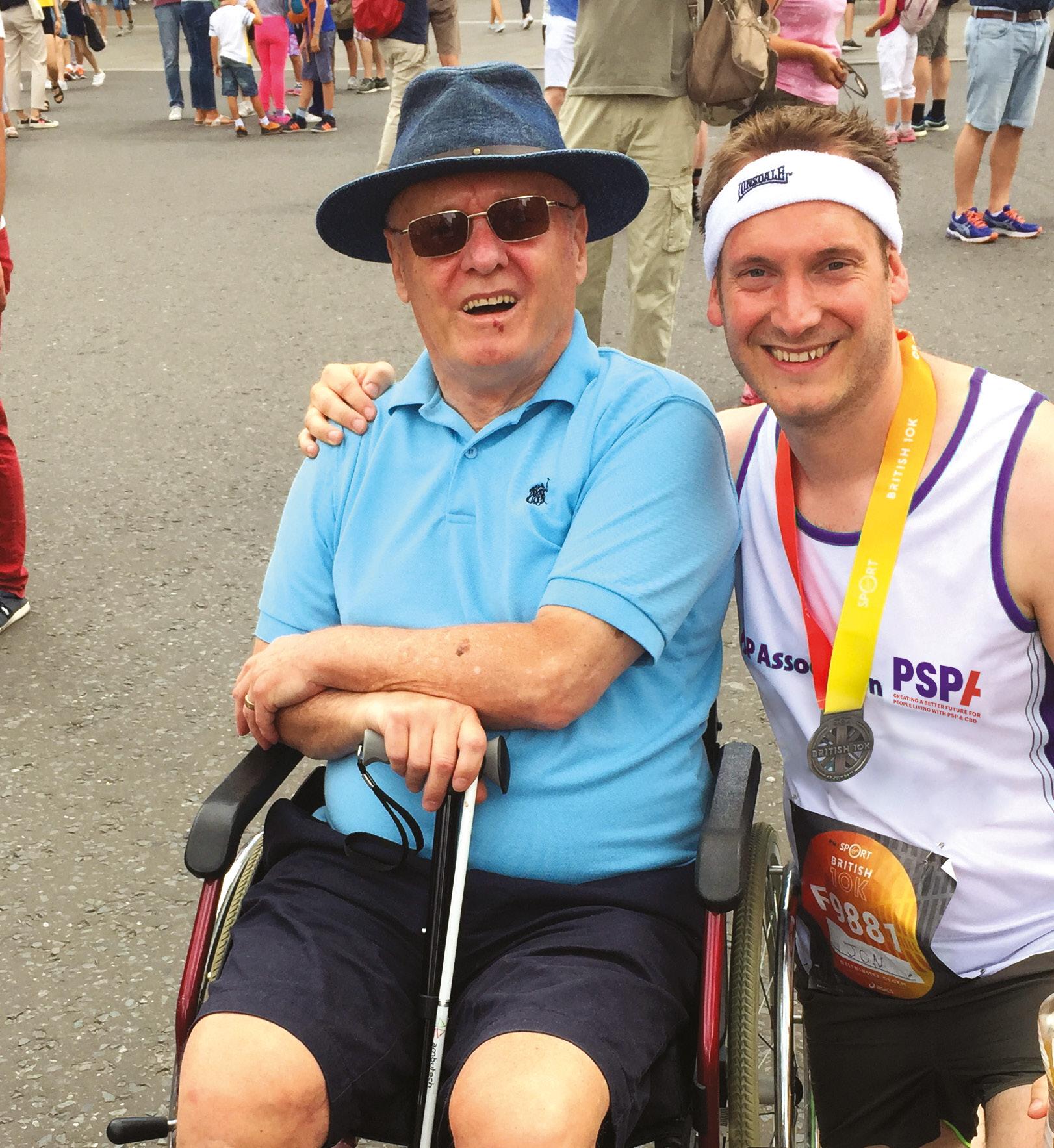

HERE FOR YOU
Our Helpline Care Navigators are here to support everyone affected by PSP & CBD. Each Helpline Care Navigator has a designated area (see map) where they provide proactive support, including:
• Information on all aspects of living with PSP & CBD, such as symptom management, benefits and entitlements and everyday living
• Emotional and practical support
• Contact details for local support, which may include Support Groups
• Information about how PSPA can support you
• Information about health and social care and how to access these services
• Signposting to other sources of information
• Referral for non-means tested benefits applications via Department of Work and Pensions (DWP) home visiting service
• Supporting evidence about PSP & CBD for Blue Badge applications and Continuing Healthcare applications
• Provide specific information written for health and social care professionals and access to Education Volunteers.
Our Helpline and information service is available Monday to Friday 9am to 9pm.
Tel: 0300 0110 122 or email helpline@pspassociation.org.uk
Margaret Powell House, 415a Midsummer Boulevard, Milton Keynes, MK9 3BN
CATHY MOUGHTON
AMANDA POTTAYYA
JAVERIA SHAFIQ
DEB RUDDOCK
KAYSHA MARLOW
DIONNE WARD
PSPA
WELCOME
This November marks four years since I joined PSPA — and what a journey it’s been! So much has happened in that time, and together, as a community, we’ve made some great progress.
We’ve introduced new services like support for carers, counselling and online exercise classes. We’ve expanded our research programme, launched a major fundraising appeal, grown the team and stepped up our efforts to raise awareness and funds. I genuinely believe PSPA is stronger than ever — and that’s all down to the passion, energy and commitment of everyone involved.
That said, there’s still more to do, but with the right support and continued momentum, we’re heading in the right direction.
Back in June, I let the team and Trustees know that I’ll be stepping down as PSPA's CEO at the end of the year to finally take a long-overdue gap year. Recruitment is already underway, and by the time you’re reading this, we should know who will be moving into the role. PSPA is in a great place for someone new to come in and take things to the next level — and I’m excited to see what’s ahead.
I’ll save the big thank yous and goodbyes for my final edition of PSPA Matters later this year. For now, let’s take a look back at what’s been a packed and positive summer!
Awareness Week kicked off on 23 June with a focus on CHC (Continuing Healthcare) funding. We hosted a fully booked Masterclass on diagnosis for healthcare professionals — a brilliant session led by our very own Trustee and Neurologist, Dr Boyd Ghosh. We also welcomed 56 people to our Family Day, and many of you got involved in our Pathway to Progress walk — thank you!
You’ll find more on all of these fantastic events inside, along with the latest updates in PSP & CBD research. As always, thank you for being part of this community.

Rebecca Packwood PSPA CEO
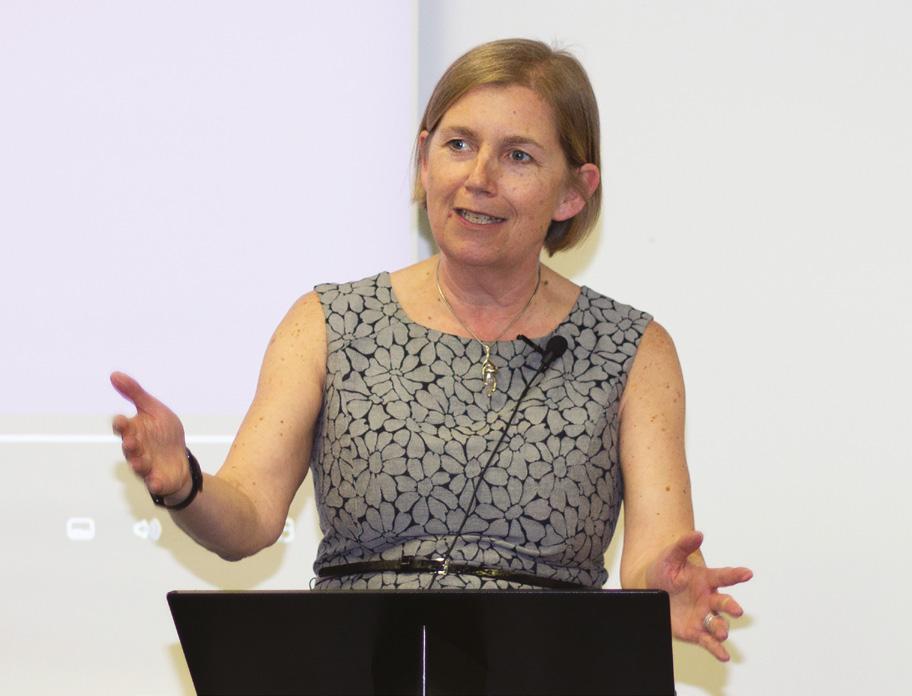
USEFUL CONTACTS
Main contact 01327 322410
info@pspassociation.org.uk
Helpline 0300 0110 122
helpline@pspassociation.org.uk
Fundraising 01327 322414
fundraising@pspassociation.org.uk
Volunteering 01327 368597
volunteering@pspassociation.org.uk
Rebecca Packwood, CEO 01327 322413
rebecca.packwood@pspassociation.org.uk
Carol Amirghiasvand, Director of Service
Improvement and Development | Deputy CEO 01327 356137
carol.amirghiasvand@pspassociation.org.uk
Helen Chapman, PSPA Matters Editor 01327 356135
helen.chapman@pspassociation.org.uk
Megan Hodgson, Research Coordinator 01327 322418
research@pspassociation.org.uk
PSPA NEWS
NEW FACES
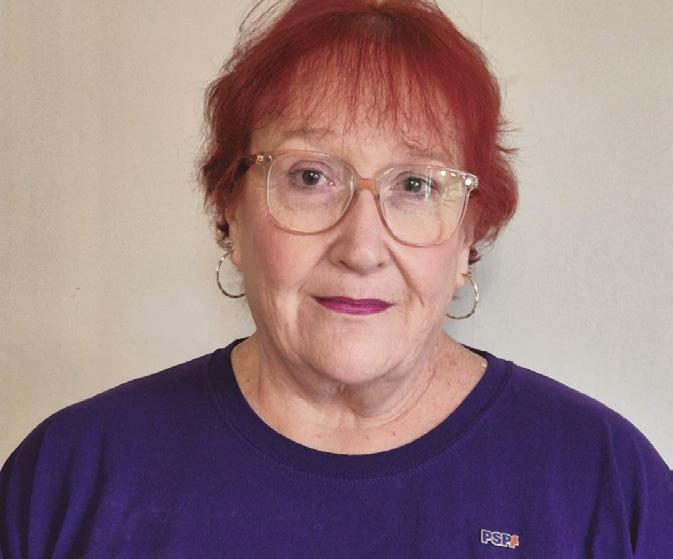
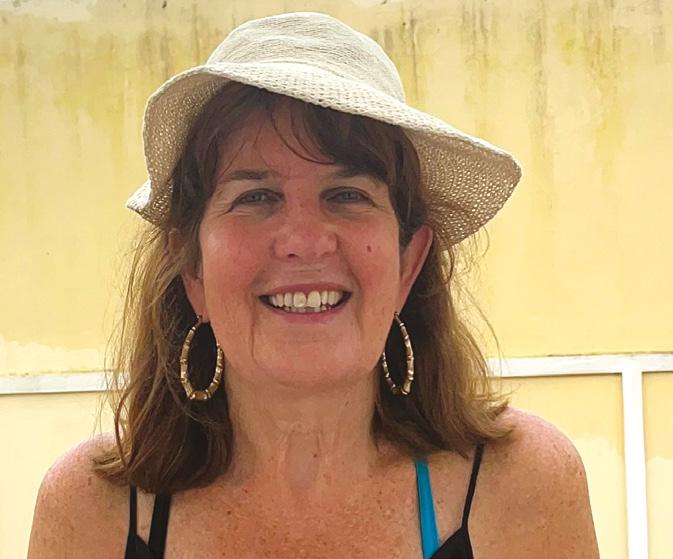
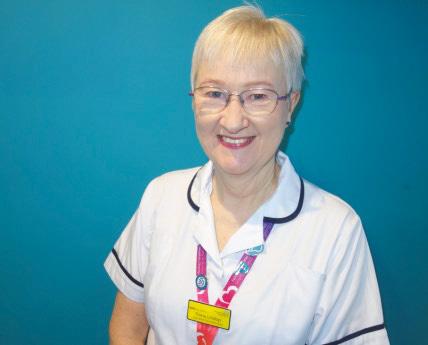
Fi Wright
We are pleased to welcome Fi Wright to the PSPA team as our new Office and Finance Administrator. Sharing her thoughts on joining the charity, Fi said: “I’m passionate about helping things run smoothly behind the scenes and contributing to a meaningful cause. Outside of work, I love visiting National Trust sites and enjoying the English countryside— especially in the warmer months!”
Two new trustees
We are delighted to announce the appointment of two outstanding professionals to our Board of Trustees, Dr Heather Angus-Leppan and Fiona Lindop MBE.
Professor Heather Angus-Leppan
Heather is a Consultant Neurologist and Epilepsy Lead at the Royal Free London NHS Foundation Trust and Professor and Director of Undergraduate Medicine at St Mary's University, Twickenham. She is Honorary Consultant Neurologist at the National Hospital, and Honorary Associate Professor at UCL Queen Square Institute of Neurology.
Heather has held leadership roles in the field of clinical neurosciences, including Honorary Secretary of both the Clinical Neurosciences Section of the Royal Society of Medicine and the Association of British Neurologists, President of the Clinical Neurosciences Section of the Royal Society of Medicine.
Her research and publications span clinical and basic science topics in epilepsy and migraines.
Heather also has a personal connection to our cause. Her dad died of PSP and she wrote about the experience as a daughter in Practical Neurology.
Fiona Lindop MBE
Fiona is a leading specialist Physiotherapist in Parkinson’s and atypical Parkinson’s conditions. Prior to her retirement Fiona was based in the Derby Parkinson’s Centre of Excellence Service and she played a key role in supporting people living with PSP & CBD.
From 2018 to the end of July 2025 she has served as Clinical Therapy Lead for the Parkinson’s UK Excellence Network. She is a member of both the Steering Group and Governance Board for the National Parkinson’s Audit. Fiona was also the physiotherapy representative for the NICE Parkinson’s Guideline (2017) and the associated Quality Standards. She co-organises and teaches on national teaching courses, based in Derby, for health professionals on the management of Parkinson's and atypical Parkinson's, including PSP & CBD.
Fiona developed the Lindop Parkinson’s Assessment Scale, a mobility assessment scale for Parkinson's and atypical Parkinson's. She co-edited and coauthored a book on multidisciplinary management of Parkinson's (including atypical conditions) for health professionals. In recognition of her service to physiotherapy, Fiona was awarded an MBE in the King's 2024 New Year Honours.
FI WRIGHT FIONA LINDOP MBE
PROFESSOR HEATHER ANGUS-LEPPAN
CHRISTMAS BAUBLE APPEAL
This November, we will launch our Christmas Bauble Appeal to help raise vital funds to support our work. The appeal will focus on the financial support the Helpline can provide to people affected by PSP & CBD to help them achieve the best possible quality of life. Keep an eye on our website for more information from November.
PSPA PODCAST SERIES 3
GOOD LUCK TEAMPSPA
GOOD LUCK TO TEAMPSPA
A huge good luck to TeamPSPA who are now on the countdown to the Great North Run in Newcastle Upon Tyne. We will be cheering you all on, every step of the way!
NEW RESEARCH STRATEGY
The latest episode of our Podcast series has launched. Episode three focuses on Neuro Heroes and features Laura Douglas, Lead Neuro Physiotherapist and Neuro Heroes Founder. In the Podcast Laura explains the benefits of movement and the impact it can have in enabling people to live the best possible quality of life. This latest episode is available to listen to on our website or by searching for PSPA Podcast on Spotify or other podcast apps.
To suggest future topics to cover please email communications@pspassociation.org.uk
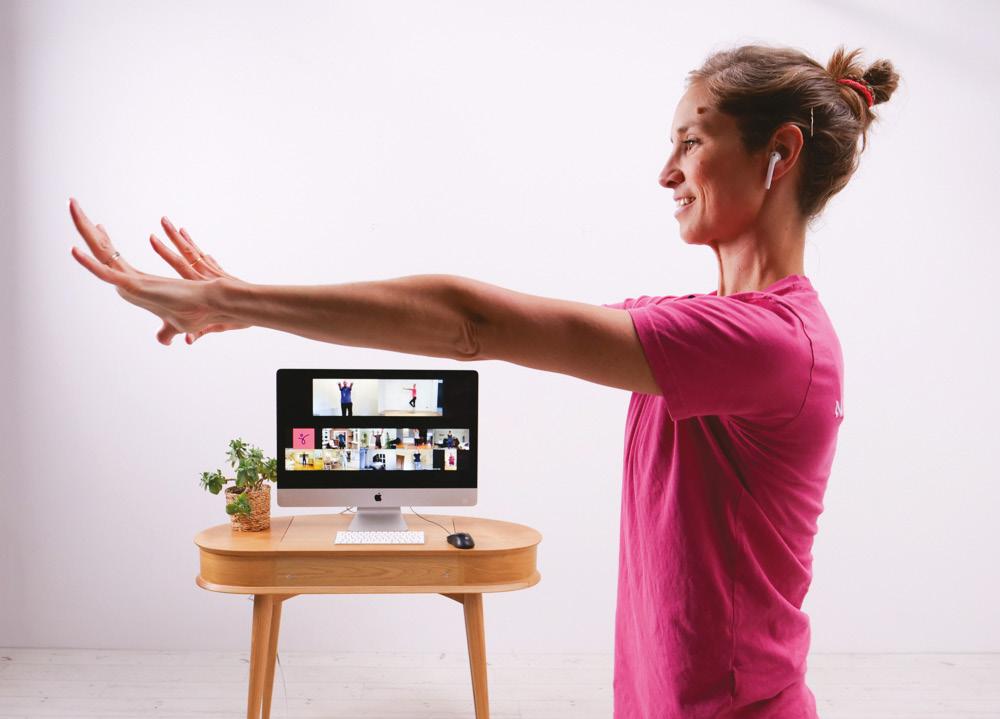
We are developing a new Research Strategy for 2026 to 2030. It will build on the previous strategy, encompassing the progress that has been made since 2020 and the knowledge we have learnt from the Understood Research Appeal.
The strategy will set out our priorities for the next five years and create a road map to track progress of PSPA funded research. The draft strategy is currently being examined and reviewed by the PSPA Services Committee, PSPA Research Involvement Members (PRIM) and our Research Committee. We're really looking forward to sharing this with you later in the year, but if you have any thoughts as to what should be included in this strategy please get in contact with our Research Coordinator Megan at research@pspassociation.org.uk
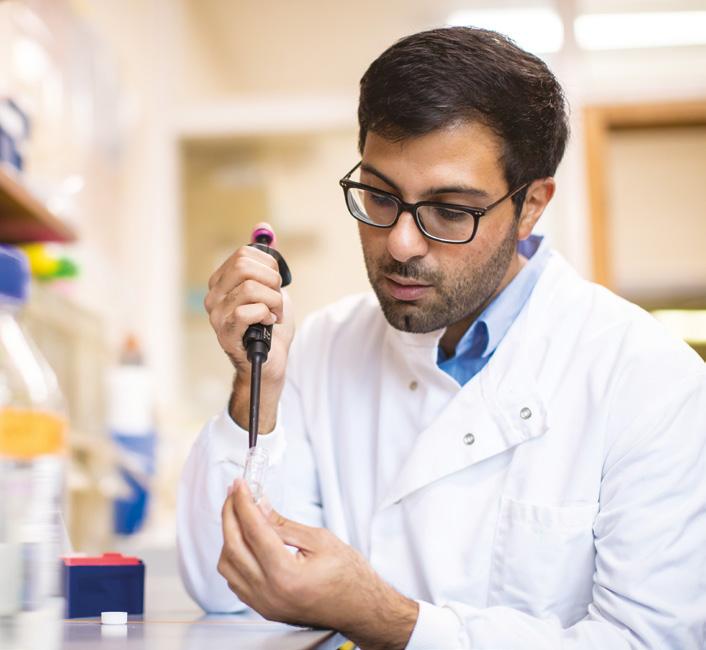
BREAKING BARRIERS
How we’ve been championing PSP & CBD this summer
Opportunities for raising awareness of PSP & CBD and how they impact daily life were rife during the summer period.
In addition to The Salt Path film releasing in UK cinemas from 30 May, PSP & CBD Awareness week took place in late June. During this annual awareness platform, we rallied you all to help us direct a call to the Government to look at how they can improve access to Continuing Healthcare Funding for families affected by PSP & CBD.
Continuing our commitment to enhancing knowledge and skills of healthcare professionals, we hosted our second Masterclass, providing vital education around diagnosing PSP & CBD on 25 June.
Here's a summary of our activities during this time frame and the impact they had across May, June and July.
IMPROVING AWARENESS WITH HEALTHCARE PROFESSIONALS
To help improve the knowledge and skills of healthcare professionals, we undertook a range of different activities during PSP & CBD Awareness Week.
On 25 June, Dr Boyd Ghosh hosted our second Masterclass for healthcare professionals. During the Masterclass, 120 attendees found out more about the unique presentation of PSP & CBD, helping them to understand the condition and make a diagnosis. You can read more about this event on page 9.
In addition, we launched our ‘It could be CBD’ animation narrated by Professor Huw Morris, to help educate professionals about the symptoms of CBD and how best to support people diagnosed. So far, the animation has been watched by 925 professionals and reached 4,600 people across social media.
During June we trialled a different approach to our monthly newsletter for healthcare professionals. This time we circulated eight different newsletters focusing on people’s professional roles. In the newsletters, almost 800 readers could access information about resources and links to support services specific to their work.
THE ANIMATION HAS BEEN WATCHED BY 925 PROFESSIONALS AND REACHED 4,600 PEOPLE ACROSS SOCIAL MEDIA.
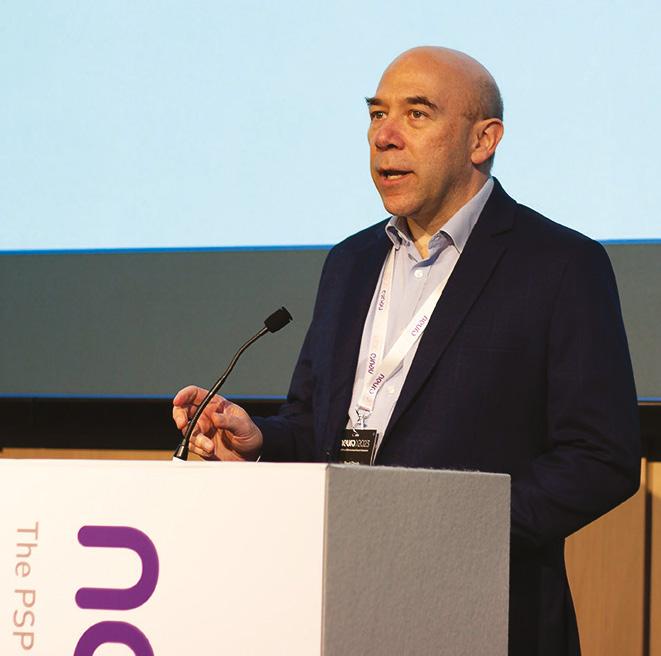

DR BOYD GHOSH
MY PATH: CORTICOBASAL DEGENERATION
Linking in with the release of The Salt Path film, we created an engaging advertising campaign to help people understand CBD better. To do this we shared two experiences of CBD, including Bruce Cleveland and Ruth Tillard.
Using these experiences, we delivered an advertising campaign in 291 cinemas across the Midlands, London and Southwest, including a 30-second advert ahead of the film screening, and posters in the cinema foyer.
To support this activity, volunteers hosted information stands in cinemas local to them.
We also used radio advertising on Heart FM and Smooth Radio in Milton Keynes, Buckinghamshire, Bedfordshire and Hertfordshire. Bus stop posters across seven sites in Milton Keynes gave an additional boost in our home city.
Thanks to our loyal supporters, we also shared CBD experiences in local and national newspapers and radio stations.
OUR CAMPAIGN IMPACT:
My Path advert played 78 times a day in 291 cinemas reaching more than 70,000 people.
70,000
7 bus stops in Milton Keynes displayed our posters 72 times a day providing 33,000 views.
33,000
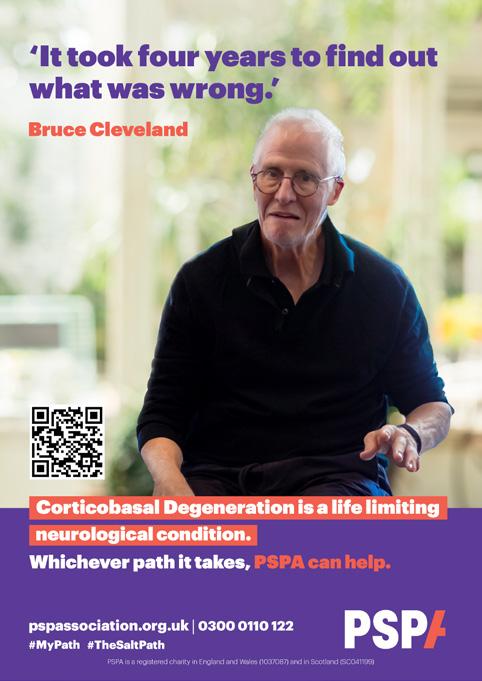

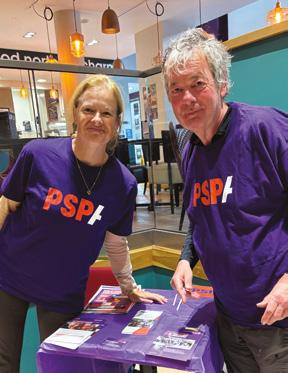
We hosted 7 information stands in cinemas plus shared leaflets with 4 additional sites.
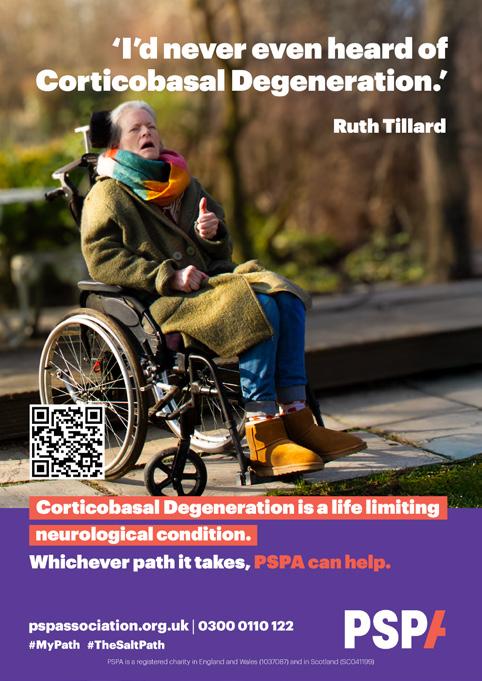

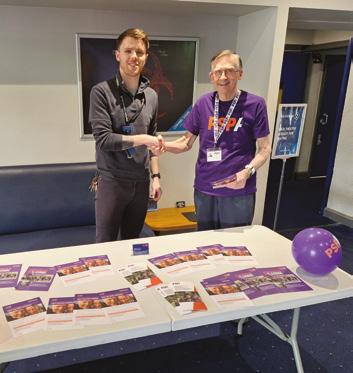
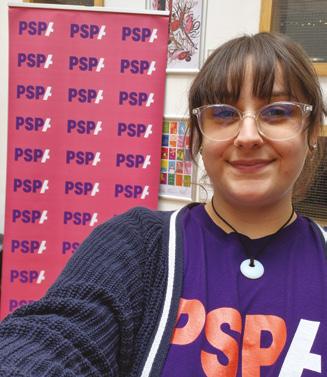
Heart FM and Smooth Radio adverts played 72 times a day to up to 200,000 listeners.
7
Social media advertising extended our reach by more than 100,000 views and directed 6,600 people to our website.
200,000
15 personal experiences were told across 3 local radio stations, 10 local newspapers, 3 national newspapers and 2 podcasts.
100,000
15
THE IMPACT OF YOUR SUPPORT:
LOBBYING MPS TO HELP #FIXCHC
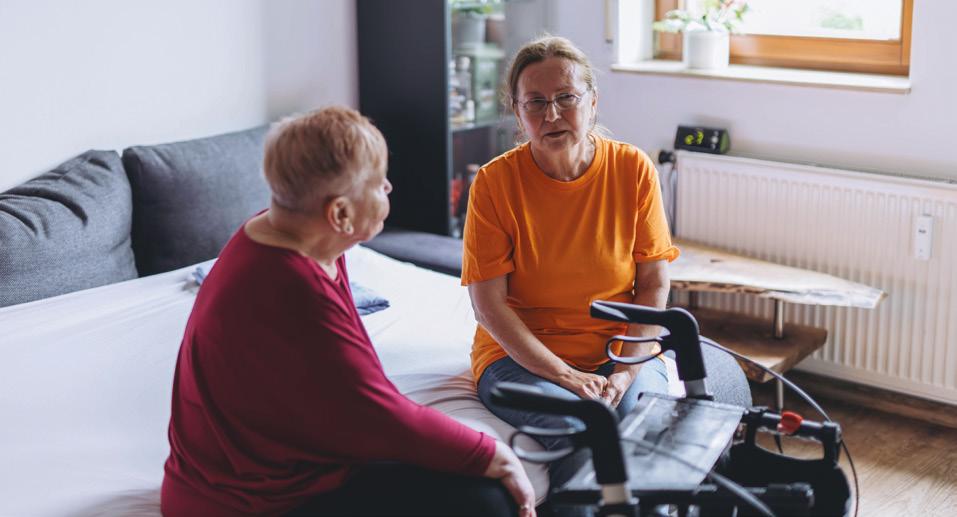
Continuing our commitment to creating a better future for everyone affected by PSP & CBD, this year we focused on improving people’s experiences of NHS Continuing Healthcare (CHC) Funding.
For this we asked our supporters to write to their MP supporting our calls to the Government to #FixCHC so that it works for everybody living with PSP & CBD by:
• Improving assessments for CHC so they take account of progressive conditions like PSP & CBD and listen to the experience of family carers
• Providing better training for healthcare professionals who undertake assessments for CHC
• Ensuring that somebody with knowledge of a person’s condition is part of their CHC assessment
• Fixing the postcode lotteries that see people with very similar needs given different support depending only on where they live.
• Fully funding CHC so nobody misses out because of financial pressures in our NHS.
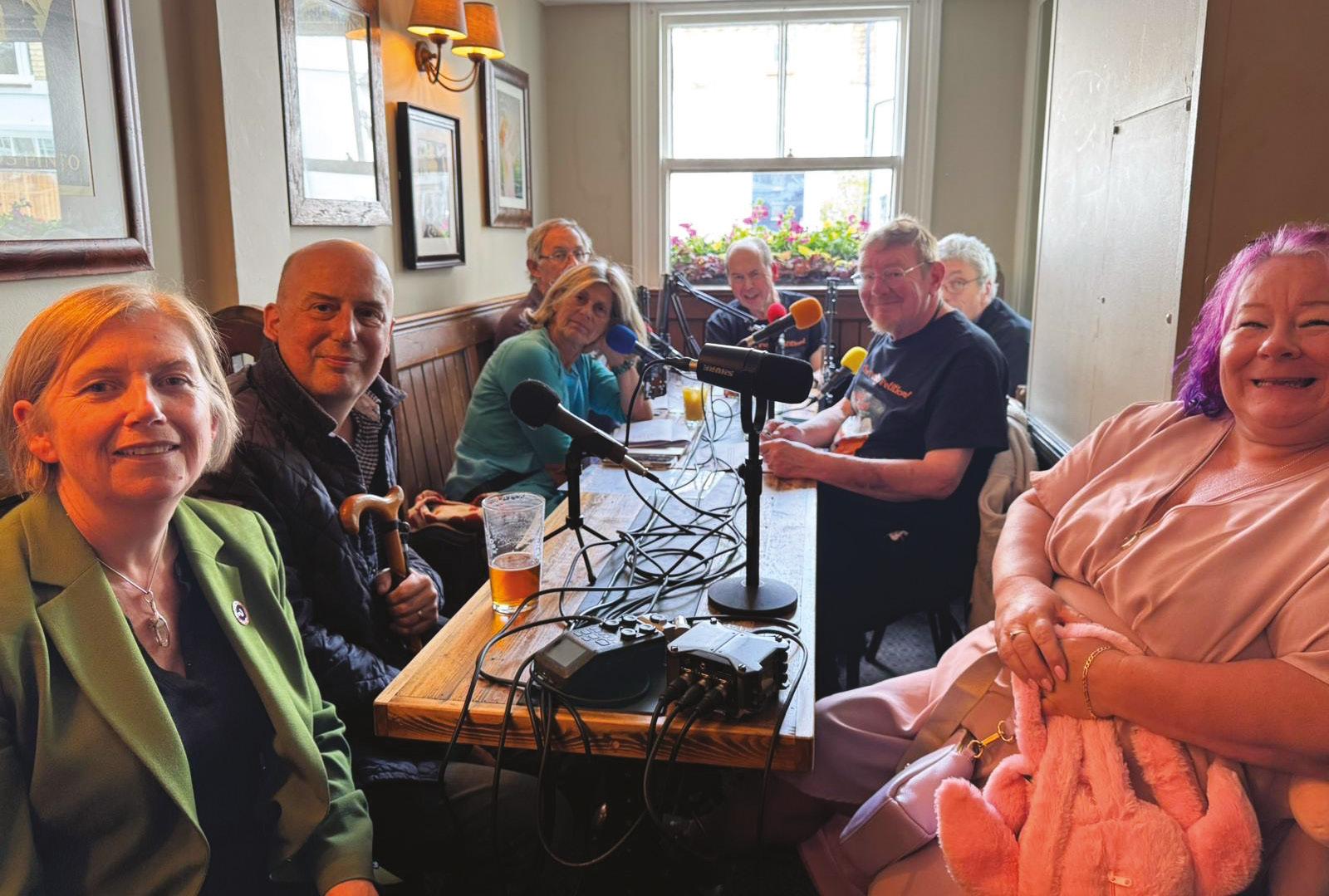
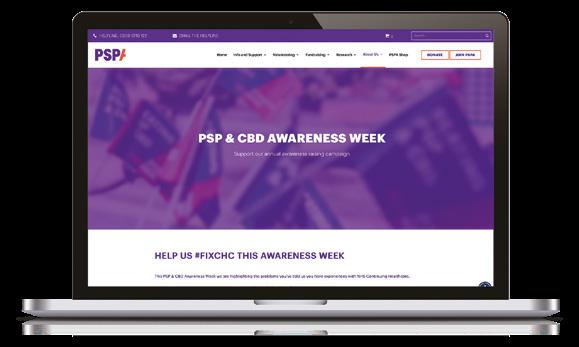
The #FixCHC campaign web page was viewed 1,166 times
1,166
83 people downloaded our State of Continuing Healthcare Report
83


314 people downloaded our #FixCHC template email
314
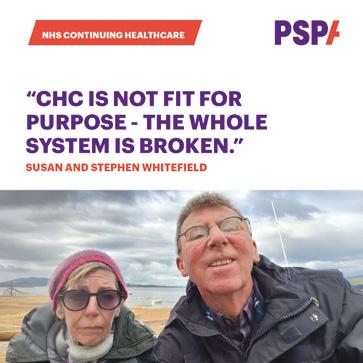
Social media posts about the campaign reached more than 18,500 people.
18,500
MOVERS AND SHAKERS PODCAST
Tune into the award-winning Movers and Shakers Podcast this September to hear the episode discussing Parkinsonian conditions. PSPA CEO Rebecca Packwood and supporter Lisa Rodrigues chatted to Rory Cellan-Jones and pals, in the episode to highlight PSP & CBD and how PSPA can help.
PSPA MASTERCLASSEARLY DIAGNOSIS AND BETTER CARE FOR PSP & CBD
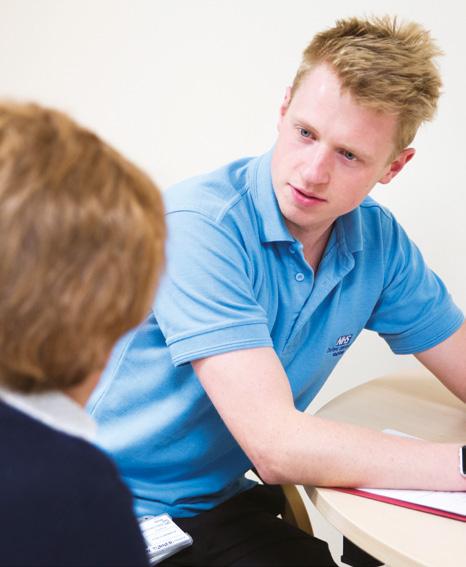
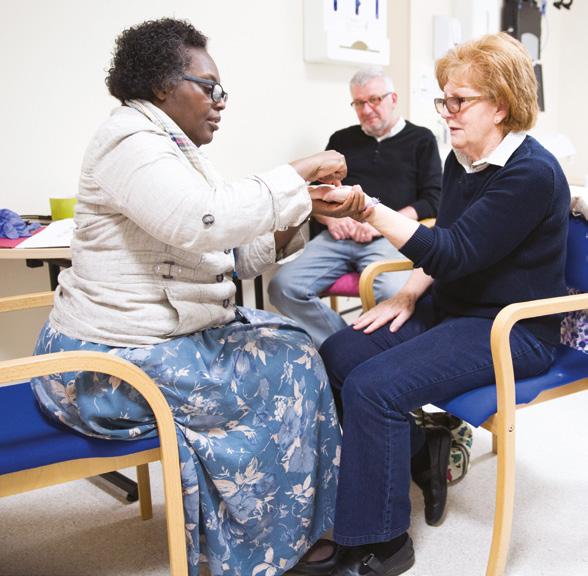
On 20 June, 120 health professionals logged on to our second masterclass to deepen their understanding of PSP & CBD. Chaired by PSPA Trustee, Greg Richardson, the session featured leading Neurologist Dr Boyd Ghosh from the Wessex Neurological Centre, whose insights were informative and clinically practical.
We all know that PSP & CBD are notoriously underrecognised conditions, with approximately 60% of patients initially misdiagnosed. On average, it takes three years to reach an accurate diagnosis—years during which patients face challenging symptoms and are without the care they need. Our masterclass aimed to equip frontline professionals with the knowledge to reduce this delay in diagnosis and help with symptom management.
Holding the sessions online enables the health professionals to attend despite managing busy workloads. One professional said: “I think that the masterclasses are a really good offering and having them later in the day means it is easier to attend. Thank you it was a really useful use of my time and very informative.”
Dr Ghosh’s presentation covered the nuanced clinical features that distinguish PSP & CBD from more common conditions such as Parkinson’s disease and Alzheimer’s. Through case videos, diagnostic criteria, and interactive discussion, attendees learned to recognise early motor and non-motor symptoms — including vertical gaze palsy, early falls, speech difficulties, and alien limb syndrome.
One attendee said: “The patient videos and explanations made it so much easier to understand the concepts,” while another shared, “Excellent slides and it was good to have a more in-depth look at symptoms and pathways.”
A strong emphasis was placed on the importance of a multidisciplinary team (MDT) approach in ensuring timely diagnosis and holistic care. Dr Ghosh outlined management strategies focusing not only on symptomatic treatments but also on supporting both patients and carers, highlighting the value of palliative planning and psychological support.
Of particular interest was the exploration of proteinopathies and the ongoing research into disease-modifying treatments targeting tau proteins, offering a glimmer of hope for future therapeutic breakthroughs.
Participants praised the session for its clarity, depth, and practical relevance. Many expressed more confidence in identifying potential PSP & CBD and referred to the session as a ‘must-attend’ for any clinician encountering atypical Parkinsonism.
Dr Ghosh talked about the importance of early recognition as this not only improves quality of life but also opens pathways to appropriate care and clinical trials — transforming the journey for patients and families alike.
Our third masterclass of 2025 will take place on 24 September at 6.30pm. This masterclass is designed for healthcare professionals looking to expand their knowledge of Falls and Mobility Management in PSP & CBD.
BOOK YOU PLACE
For more information about this masterclass and to book tickets just scan the QR code.
BROADCASTING OUR APPEAL TO BBC RADIO 4 LISTENERS
Earlier this year we successfully applied to become one of the charities BBC Radio 4 featured as part of their appeal programme.
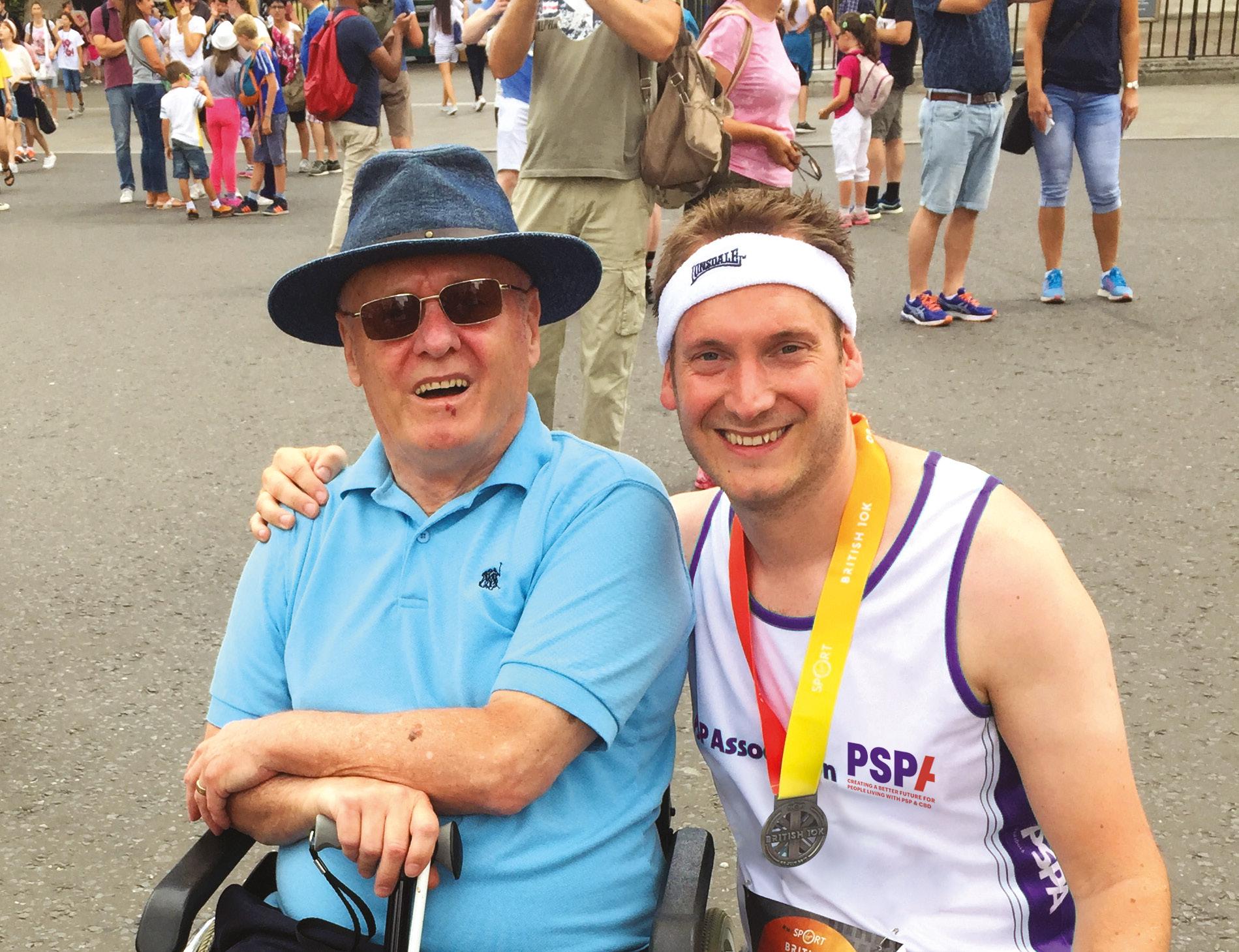
To take fundraising for our Understood Research Appeal to the next level, we will be broadcasting to BBC Radio 4 listeners on Sunday 19 October.
PSPA Trustee Jon Garrard is our dedicated presenter for this task, and he will be sharing his own experience of his dad, Chris, being diagnosed with PSP. And why he and his family support our appeal to fund more research; to help establish fast and accurate diagnosis, immediate treatment and consistent standards of care.
Here you can take a sneak peak at the appeal Jon will be making on PSPA’s behalf.
Jon says:
"It wasn’t easy talking to my dad about his health. He’d always been my strength, and my best friend. But when his personality began to change, and he started to have falls, I couldn’t ignore it and insisted he see a doctor.
The doctor diagnosed Parkinson’s disease before dad had even sat down. But further investigations finally led dad to be diagnosed with a condition we’d never heard of. It’s called Progressive Supranuclear Palsy, or PSP for short.
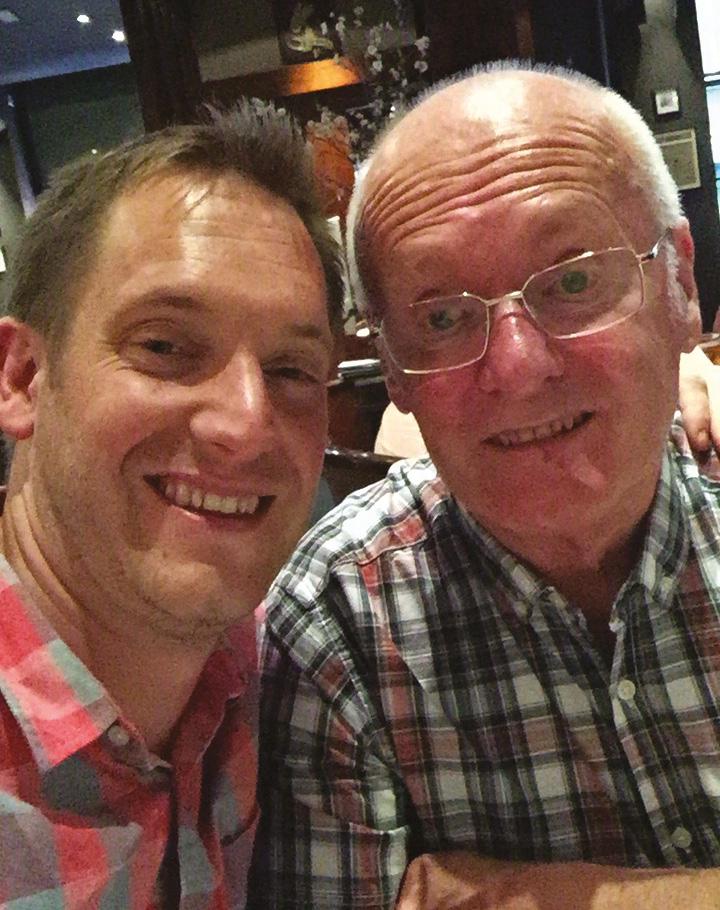
The prognosis wasn’t good – PSP is a rare and incurable neurological condition. Life expectancy is just five to seven years; we faced a ticking time-bomb from a disease we had no understanding of.
So, I began my research. And it was whilst searching online, that I came across the PSP Association – the only charity in the UK which is supporting families, like ours, who are affected by PSP in some way.
The charity became a lifeline for my family at an unbelievably difficult time. There was the Helpline that provided a listening ear and information on the condition. And they also provided training for some of the healthcare professionals involved in dad’s care, so they could also learn more about the condition and how to best look after him.
But one thing that really stood out in their offering was their commitment to research.
It gave me something to fight for, through fundraising and then becoming a Trustee of the charity. And it gave dad a positive focus; taking part in research studies made him feel like he was contributing to the greater good, although he understood a breakthrough
JON WITH HIS DAD CHRIS
wouldn’t happen in his lifetime, he felt he was helping doctors understand the condition so they could improve diagnosis, treatment and care for people diagnosed in the future.
Sadly, within a year, the condition completely transformed dad. He couldn’t walk, talk and needed help to dress and eat. And just four years after his diagnosis, dad lost his fight to this unrelenting disease.
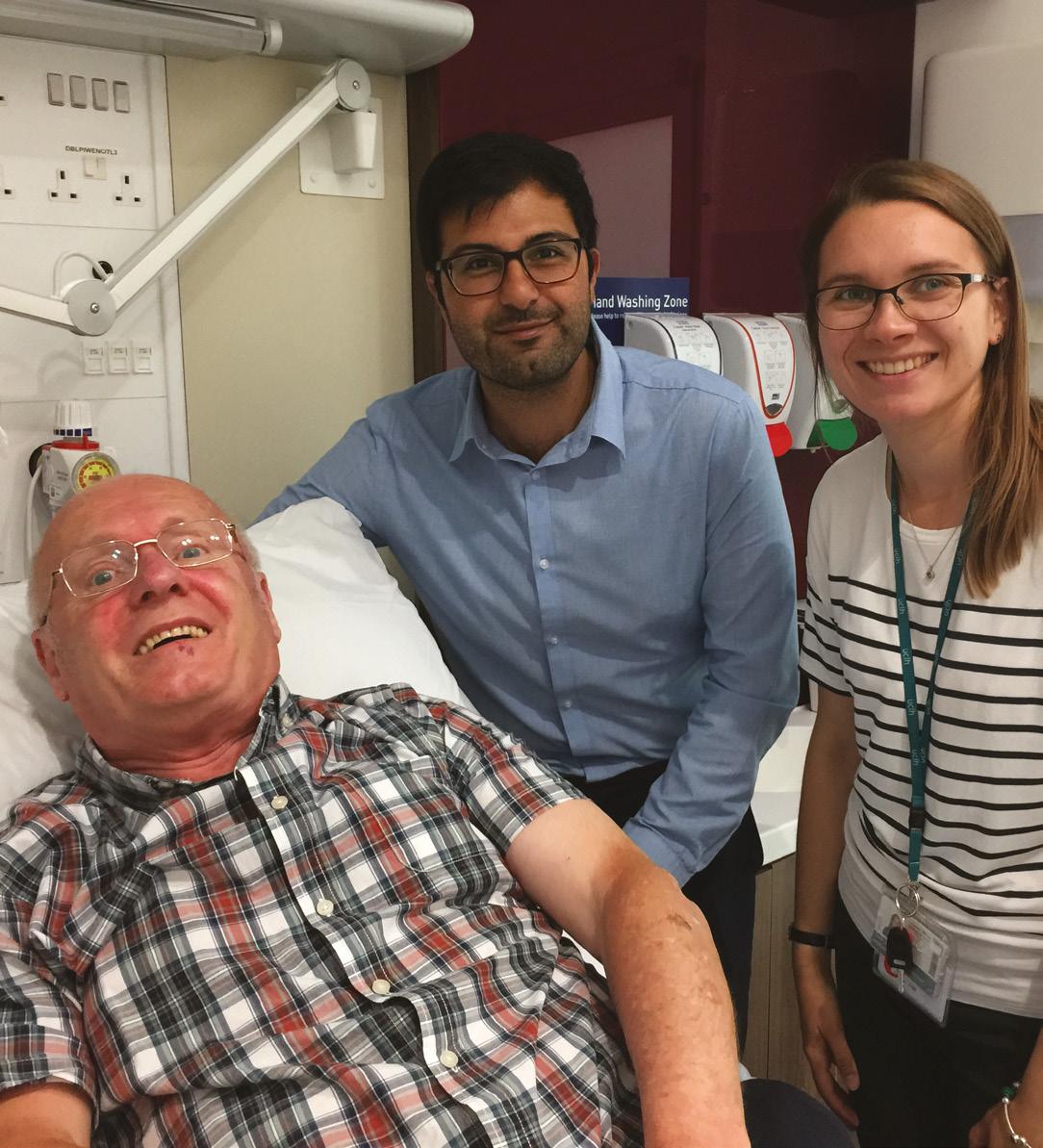
CHRIS WITH DR EDWIN JABBARI AND RESEARCH ASSISTANT CHARLOTTE RAWLINSON
UNDERSTOOD RESEARCH APPEAL
And that’s why I’m here today.
There’s much we still don’t know about the condition, but science is getting closer to establishing a test that would help diagnose the condition faster.
Your donations will go towards funding more research to improve our understanding of Progressive Supranuclear Palsy, and studies so we can, one day, hopefully make the diagnostic test a reality."
HOW YOU CAN SUPPORT OUR BBC RADIO 4 APPEAL
If you would like to support our BBC Radio 4 Appeal and help, make this vital research a reality, you can donate via our website or the BBC.
To help make your donations go further, a generous PSPA supporter is offering to matchfund up to £50,000 raised through this Radio 4 Appeal.
You can donate to life-changing research by searching for BBC Radio 4 Appeal or call 0800 404 8144. Alternatively, you can send in a cheque donation written to PSPA and addressed to BBC Radio 4 Appeal. Thank you.
LISTEN TO OUR APPEAL
Our BBC Radio 4 Appeal will be airing on Sunday 19 October 2025.
Our Understood Appeal is aiming to raise £2 million for research, to help create a step-change in research into PSP & CBD. If you’re able to donate any amount, large or small, please visit www.pspassociation.org.uk/research/understood
Money raised from the Appeal will be invested in…
• Quick and accurate diagnosis – on average, it takes over three years to receive a diagnosis of PSP or CBD. Earlier diagnosis can improve access to treatment and services at an earlier stage to improve quality of life. It would also increase the number of people eligible for clinical trials.
• Immediate treatment – there are currently no approved disease-modifying treatments for PSP or CBD, and limited options to manage symptoms.
• Consistent care – access to specialist services is a postcode lottery. We want everyone affected to receive informed, coordinated care, no matter where they live, from educated health professionals who understand the complexities of living with a rare neurological condition.

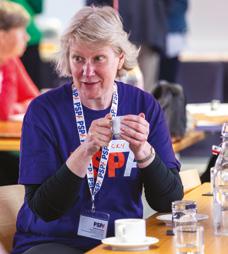
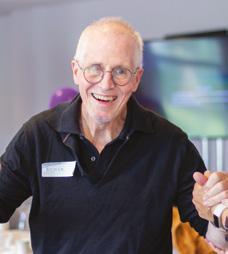
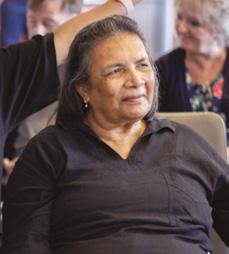
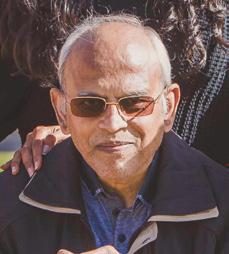
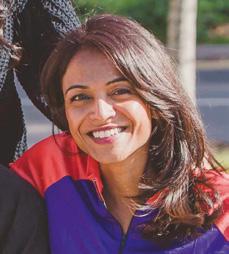
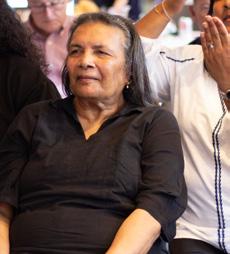
NEW PSP CLINICAL TRIAL PLATFORM IN THE USA
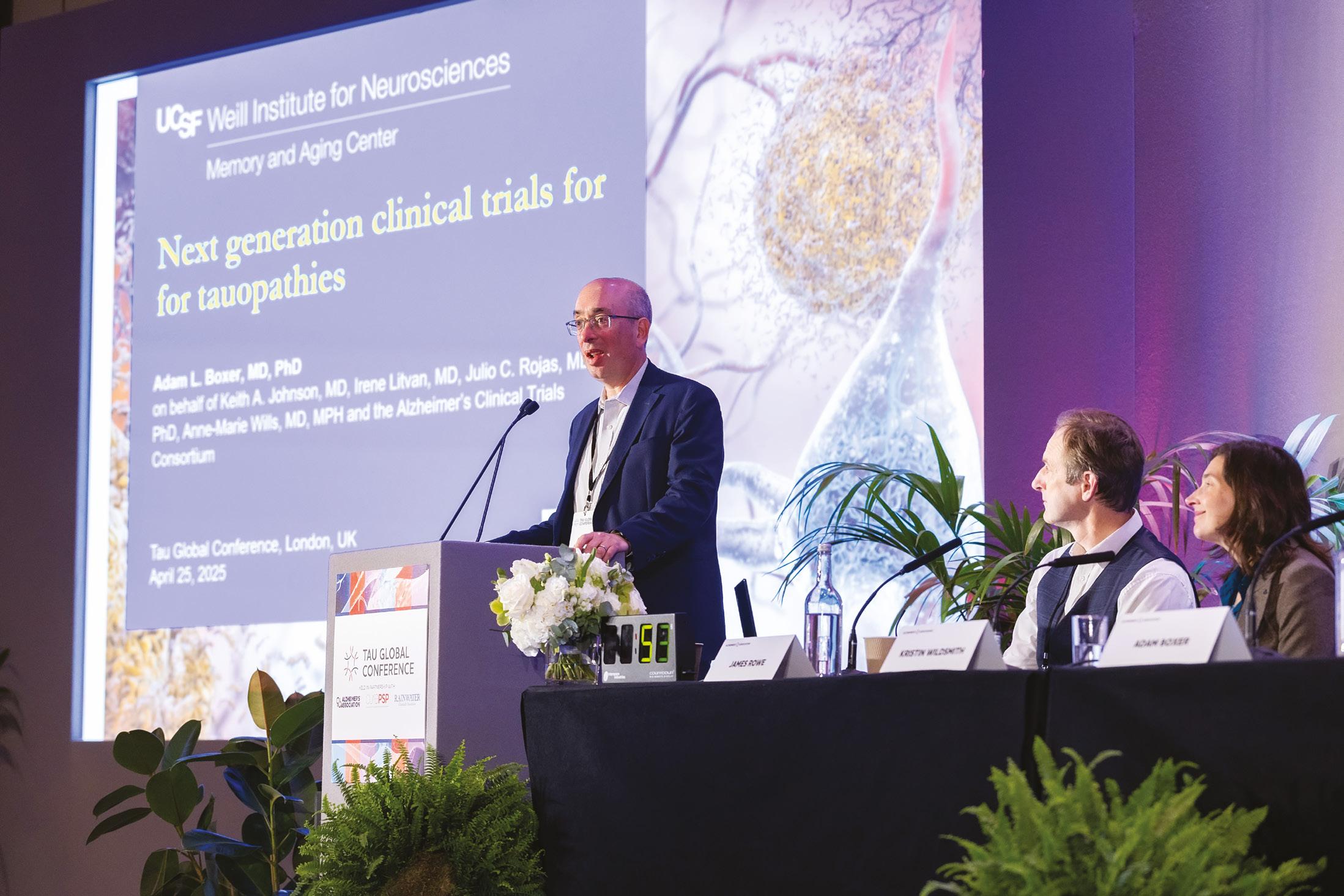
An exciting new clinical trial platform is soon to begin across the pond in the USA, led by Dr Adam Boxer at University of California, San Francisco. The PSP Trial Platform (PTP) has been made possible through a $75 million grant from the National Institute on Aging (NIA), which is part of the National Institutes of Health (NIH) and will test a minimum of three drugs to see if they can slow progression of PSP and improve quality of life.
WHAT IS A PLATFORM TRIAL?
A platform trial differs from a traditional clinical trial in multiple ways. Firstly, it is open ended. Drugs can be added and removed as the trial progresses, meaning that if a drug is shown to be of no benefit it can be removed from the trial at an earlier stage.
There is a single control group which is used as a comparison to the multiple drug arms. In the case of the PTP, the ratio of drug:control is 3:1, meaning that
more people taking part get access to a drug with potential benefits. A platform trial’s design allows for a more flexible and efficient assessment process with lower cost and less burden to participants.
THE PSP TRIAL PLATFORM
The trial will run across 50 sites in the USA and will be the first platform trial of its kind in PSP, modelled on a trial for the similar condition Amyotrophic Lateral Sclerosis (ALS), or more commonly known in the UK as Motor Neuron Disease (MND). So far, the first two drugs to be tested have been announced.
Drug 1 is AADvac1, developed by Axon Neuroscience, a pharmaceutical company based in Bratislava, Slovakia. AADvac1 is an active immunotherapy which targets pathological tau proteins in the brain.
The active immunotherapy causes the production of antibodies that bind to faulty tau and prevent it from clumping together in the brain or spreading.
DR ADAM BOXER, CHIEF INVESTIGATOR FOR THE STUDY PRESENTING AT TAU 2025
DRUGS CAN BE ADDED AND REMOVED AS THE TRIAL PROGRESSES, MEANING THAT IF A DRUG IS SHOWN TO BE OF NO BENEFIT IT CAN BE REMOVED FROM THE TRIAL AT AN EARLIER STAGE.
It also aids in its clearance by microglia. The drug has previously been studied in Alzheimer's disease which shares the tau pathology with PSP, and it showed a good safety profile in the 24-month Phase 2 study. There were positive clinical indications of potential slowing of disease progression as well as changes in the plasma and cerebrospinal fluid (CSF) biomarkers.
Drug 2 has been developed by Alzprotect, a French pharmaceutical company based in Lille. AZP2006 has been in development for many years and is designed to restore lysosome function and modulate progranulin while reducing inflammation in the brain and tau clumping. This small synthetic molecule has been testing in a small number of people with PSP in a Phase 2a study in France.
Over the three month study AZP2006 showed encouraging efficacy in both the clinical and biomarker signals. The continued six month open label extension reinforced these promising results. The compound has received Orphan Drug Designation from both the U.S. Food and Drug Administration (FDA) and the European Medicines Agency (EMA).
These two drugs alongside a third (which is yet to be announced) will be tested in a double-blind 12-month study, followed by an optional 12-month open label extension where those on the placebo can receive the trial drug. The trial will be assessing safety, tolerability and clinical proof of concept based on clinical rating scale, the modified PSP Rating Scale-15 (mPSPRS-15).
The trial is hoping to begin recruitment at the end of 2025, assisted by the charity CurePSP. There is a real focus on recruiting people who are normally underrepresented in clinical trials, with transport and hotel costs being covered to alleviate financial burden of participating and language support being provided.
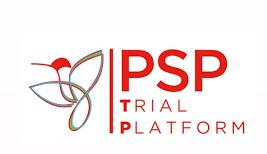
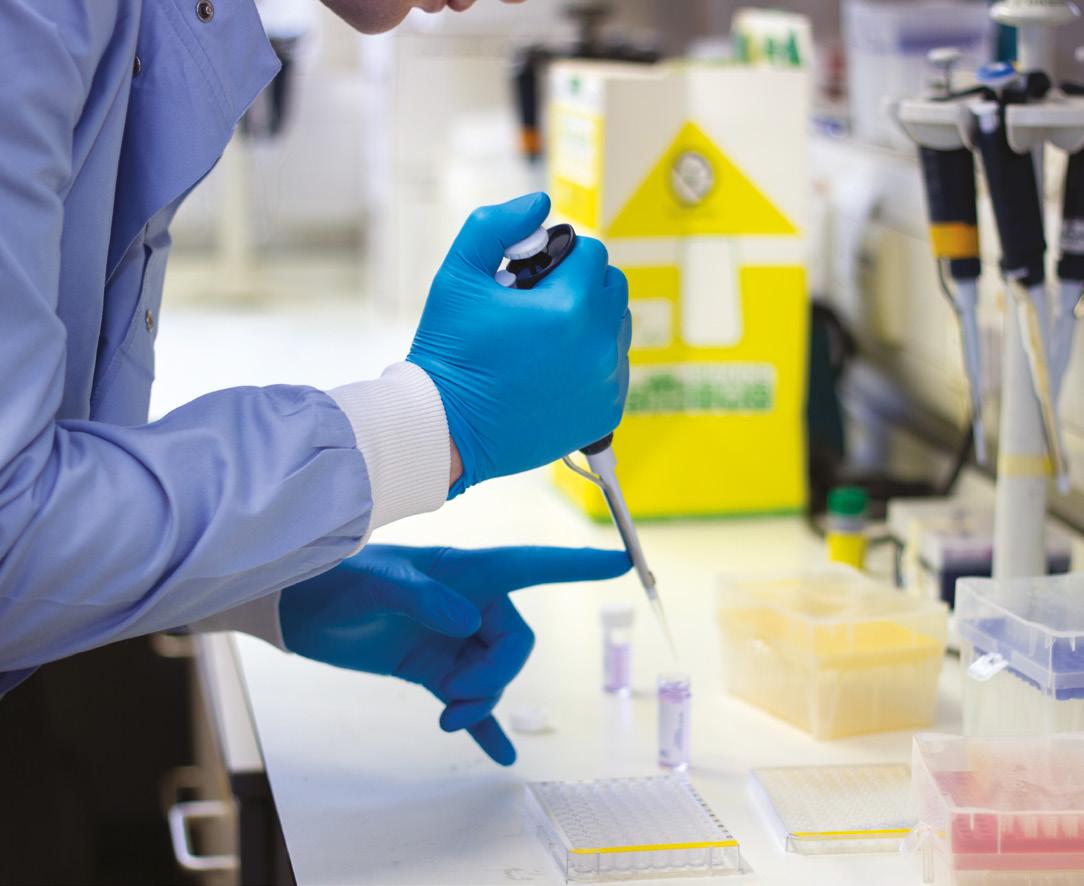

We are excited to see this trial beginning soon and look forward to hearing the results. This trial will only be recruiting in the USA, but you can express an interest in taking part in projects and trials running in the UK by scanning the QR code, or email research@pspassociation.org.uk for a paper copy.
NAVIGATING WALES AND SCOTLAND
Earlier this year two Helpline Care Navigators joined PSPA to help improve care and support across Scotland and Wales.
Dionne, in Wales, and Amanda, in Scotland are working hard to help people affected by PSP & CBD in these nations, navigate local health and care systems, connect with services that meet their needs and improve awareness of both conditions among health and social care professionals. Here, Dionne and Amanda explain more about the role and what they are doing to improve standards of care.
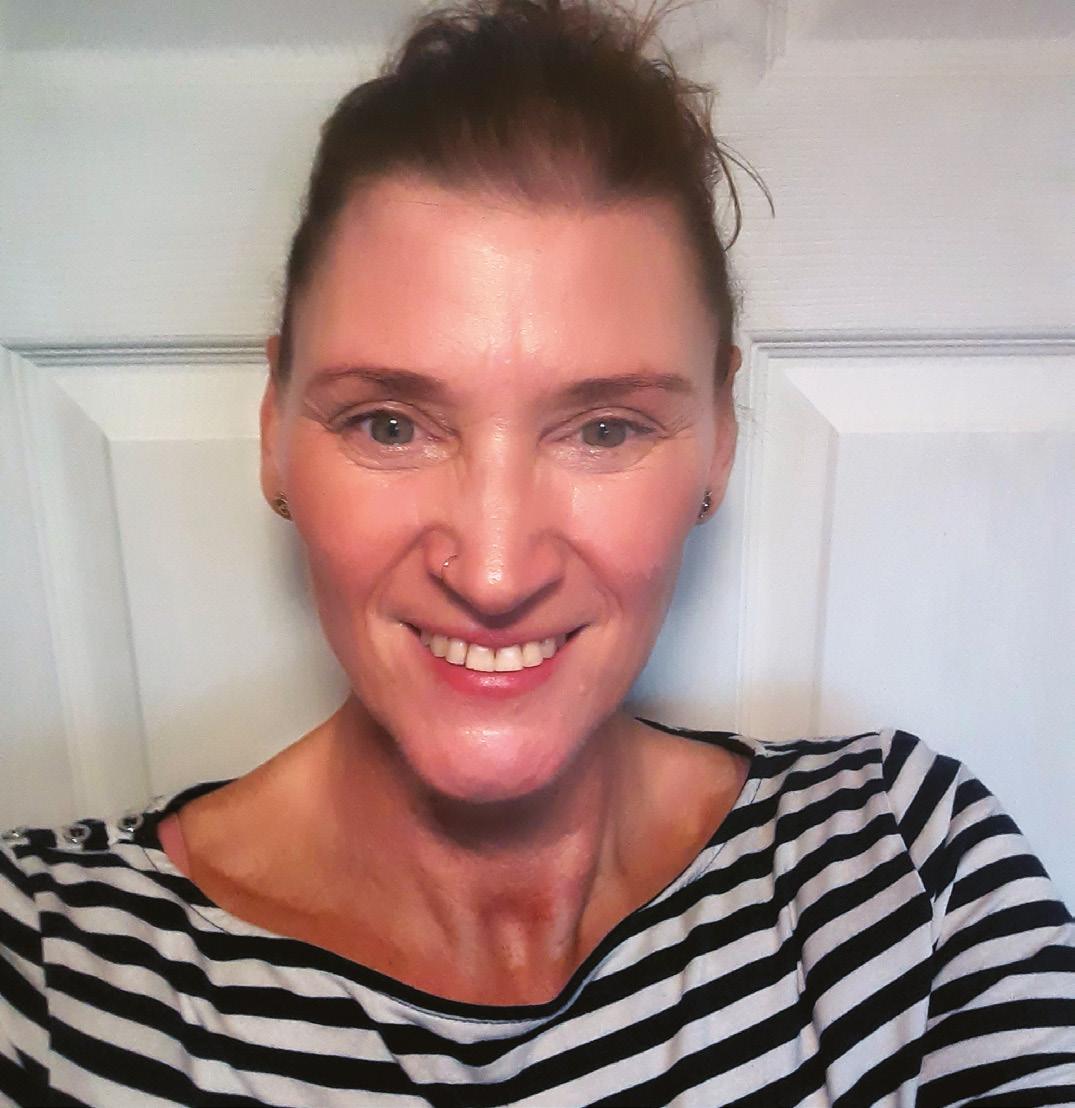
DIONNE WARD, WALES
“I live just above the Brecon Beacons, and from the moment I arrived I was welcomed into the community with open arms. It’s very rural, which can be challenging, but I’ve been lucky.
“Before moving here, I worked for the Alzheimer’s Society, supporting people in my local area doing house calls and face-to-face visits. My background is in support, and I’m also a qualified counsellor. I’ve worked as an area manager, led training and education sessions, and supported people through the hardest times in life, including terminal illness. I also cared for my dad at the end of his life, so I understand things from a carer’s perspective.
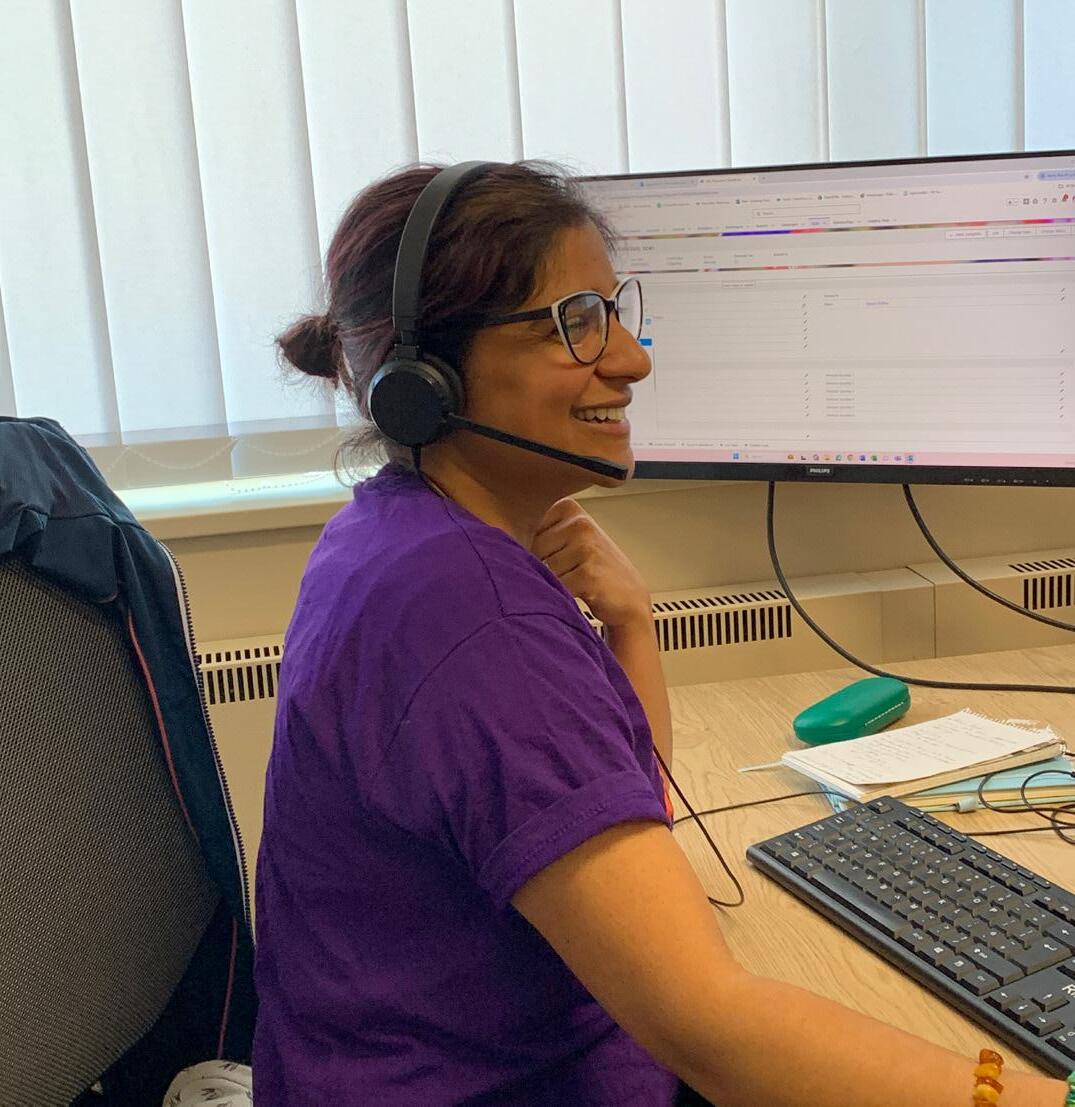
“Wales is different from other regions—more rural, less connected to local services, and often overlooked. It’s why it’s so important that someone local is here on the ground. I’ve travelled across Wales meeting health and social care professionals, raising awareness of PSP & CBD.
“I support people by phone, send out information packs and signpost people to sources of support. I try to check in with people every four to six months. The support we offer over the phone can be very wide ranging. It might be about accessing benefits or connecting them to local groups like neuro cafes. Sometimes it might be simply to listen.
DIONNE WARD
AMANDA POTTAYYA
"THE SUPPORT WE OFFER OVER THE PHONE CAN BE VERY WIDE RANGING. IT MIGHT BE ABOUT ACCESSING BENEFITS OR CONNECTING THEM TO LOCAL GROUPS LIKE NEURO CAFES."
I’m aiming to get more support groups set-up in Wales. We have a well established group in North Wales and I want to replicate that in South Wales. Support groups are so valuable in terms of providing peer support and for connecting people who are in similar situations.
“In September, a Neurologist who is moving back to Wales will be setting up a clinic in South Wales which I hope to attend regularly. PSP & CBD are often misdiagnosed, so our goal is to build a betterconnected network with more specialised clinics and peer support groups.
“If you need help—please, pick up the phone. That’s what we’re here for. You're not just getting support, you're helping us build something better for everyone.”
AMANDA POTTAYYA, SCOTLAND
“Before joining PSPA, I worked as a Hospital Carer Support Worker with Fife Carers Centre. I was based in Fife’s only acute hospital, supporting carers at crisis point and worked alongside the discharge team to ensure carers had a voice in the process. It was a rewarding role—mediating between hospital staff and carers, making sure care plans worked for everyone involved. I gained a better understanding of social work processes, how things move within a multidisciplinary team and further utilised my knowledge of the Scottish welfare benefit system.
“I live in Fife and have been in Scotland for almost 12 years. I'm originally from the North West of England. My partner is Scottish, and before moving into the charity and health sector, I worked in media—film and TV.
“Now, with PSPA, I’m focused on building a network across Scotland. If a call comes into the Helpline from someone in Scotland, if I’m available, it will be put through to me. It does help to have someone who understands the local health and social care system.
“Every call is different - sometimes it’s about how to access benefits, sometimes it’s someone newly diagnosed who doesn’t know where to turn. I connect with patients, carers, and professionals, making
sure they feel heard and supported. I also provide information on PSPA services including our support grants
“If someone is struggling to get their social worker to understand, we can write a supporting statement and also get in touch with the social worker on their behalf. I can speak to people’s Parkinson’s nurse which many find helpful.
“I’m seeking to build connections with health and social care professionals. They are the ones who can make a big impact to people living with PSP & CBD. I attend both face-to-face and online Multidisciplinary Team (MDT) clinics in Glasgow and Kilmarnock alongside consultants, Parkinson’s nurses and physiotherapists. During the clinics each patient is discussed including a review of their symptoms and what equipment or care they may need.
“My input varies within clinic, mostly taking into consideration practical support measures rather than clinical. For example, in one clinic we had a PSP patient who was using a rollator. I raised the risk that he may no longer have the cognition to be vigilant about ensuring the brakes are on, meaning he could slip forward. So the occupational therapist and physiotherapist are now looking at other options.
“I’m there to help ensure the support is holistic. It’s not just about medical care—it’s about understanding people’s lives, supporting carers, and being a point of contact when things get overwhelming. I can step in and have conversations with the family, such as Lasting Power of Attorney that health and social care professionals sometimes don’t have time to do.
“I’m working with local teams to try and get more MDT clinics set up in Scotland. I have seen how they can improve the care people with PSP & CBD receive and want to ensure everyone living with either condition has access to them.”
PSPA FAMILY DAY 2025
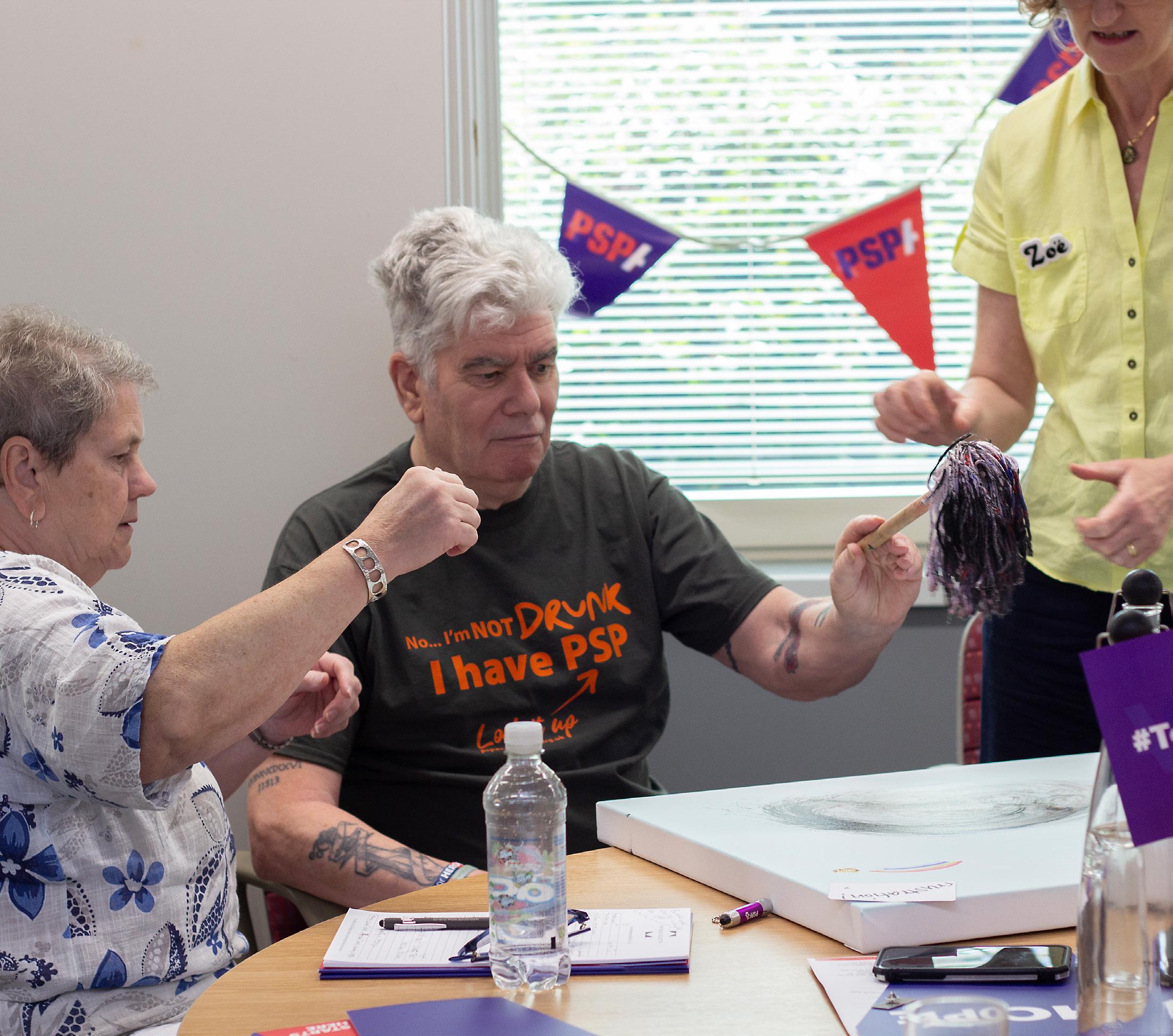
THE 2025 GATHERING OFFERED A MIX OF PRACTICAL ADVICE, EXPERT INSIGHT, UPLIFTING MOMENTS, AND EVEN A BIT OF CHAIR DANCING!
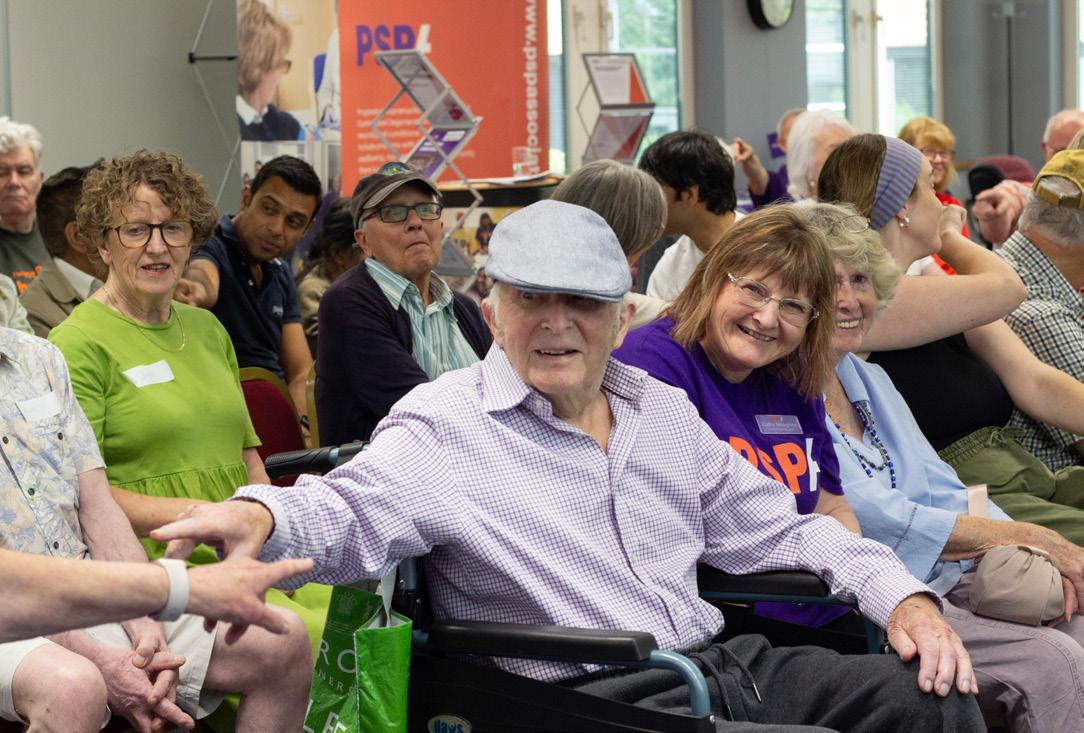
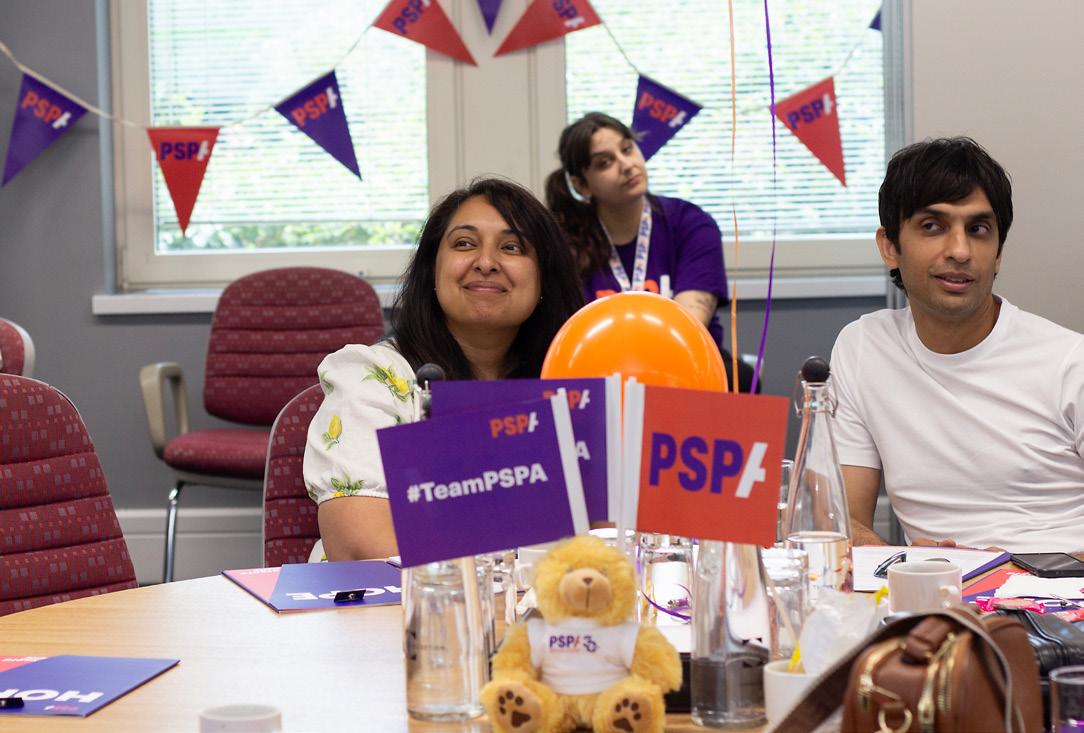
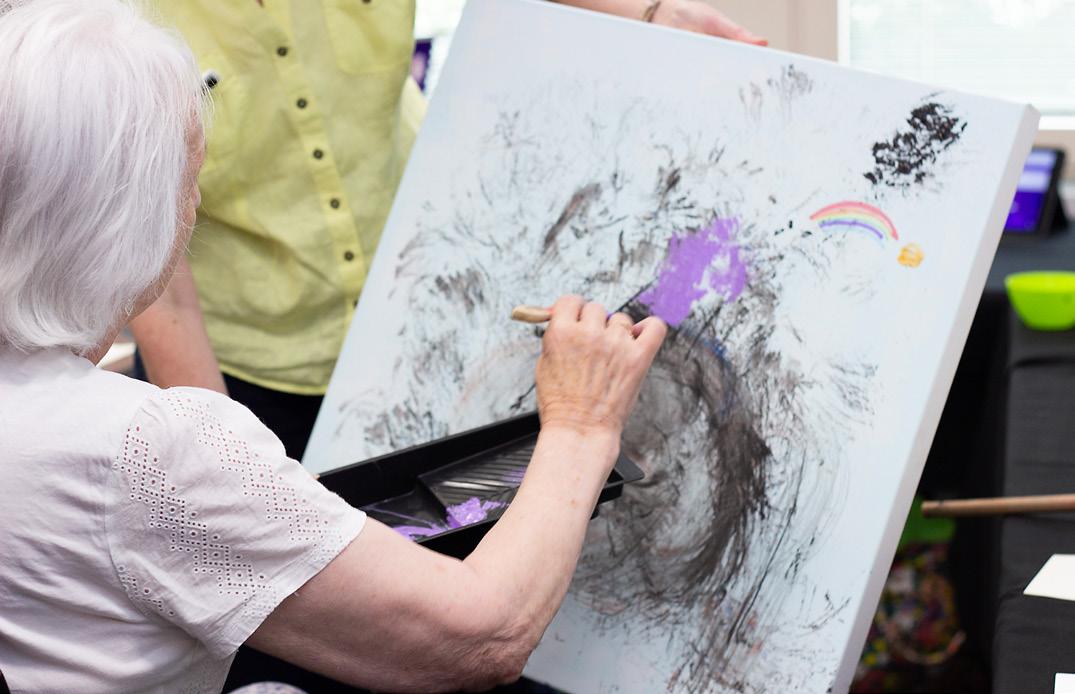
One of the most difficult aspects of living with a rare disease is the sense of isolation—feeling like no one else truly understands what you're going through. That’s why our PSPA Family Days are such a vital event in the PSPA calendar. It's a unique opportunity for people affected by PSP & CBD to come together, share experiences, connect with others, and hear directly from experts at the forefront of research and care.
Following successful events in recent years in Leeds, Belfast, and Stirling, this year’s gathering took place in Milton Keynes. The 2025 gathering offered a mix of practical advice, expert insight, uplifting moments, and even a bit of chair dancing!
The day was chaired by Paul Inness, former PSPA Trustee and carer for his mum who had PSP. With empathy and humour, Paul welcomed everyone and introduced the first speaker, Neurologist Dr Negin Holland. Dr Holland’s talk outlined what happens in the brain with PSP & CBD, explained the complexities of diagnosis, and—importantly—offered hope through emerging research.
Next, Ciara Mackie, an NHS Dietitian, gave practical advice on how to maintain or gain weight through food fortification. For those who find mealtimes challenging and time-consuming, her tips were a game-changer. (And yes, we all now know just how calorie-rich double cream really is!)
Rounding off the morning was an engaging and heartfelt session from Kym Winter, CEO and founder of Rareminds, a counselling service for people living with rare conditions. Kym’s talk struck a powerful chord with attendees, reminding us that taking care of our mental health is just as crucial as looking after our physical well-being.
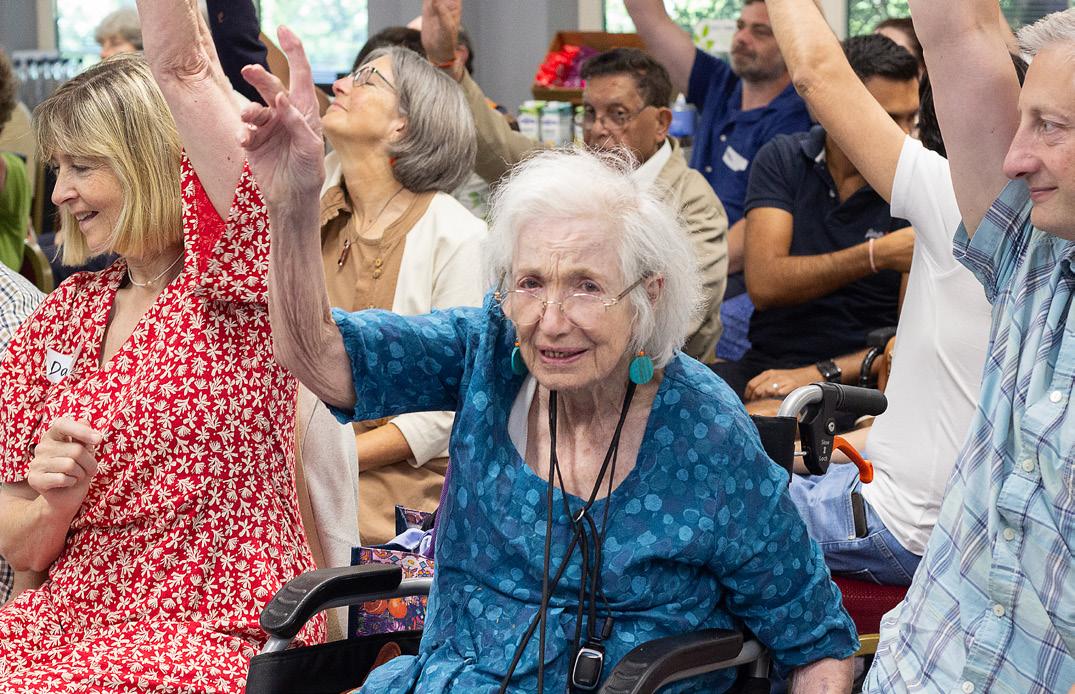
During a break for lunch, attendees had the chance to take part in an informal art session with artist Zoe Gilmour. Together, we produced three canvases titled Love, Frustration and Joy, which will be proudly displayed at PSPA’s offices as a lasting reminder of the day’s emotional journey.
The afternoon wrapped up on a high-energy note with a fun and inclusive seated exercise session led by Kath Thomas from Neuro Heroes. We got a great taster of their free online classes, specially designed for people with neurological conditions. For more information visit our website or call the PSPA Helpline.
Feedback from the day reflected how valuable it was for so many. One attendee said: “I was apprehensive about coming to such an event and had never been to anything like this before. It was very new to all of us. I was pleasantly surprised how comfortable I felt.” Another said: “We thoroughly enjoyed the day and felt that we had learned a lot about PSP.”
From expert talks to expressive art and energising movement, Family Day 2025 reminded us of all of the power of community, knowledge, and a little bit of fun. Whether you came for the science or the support, everyone left feeling a little more connected.
“WE THOROUGHLY ENJOYED THE DAY AND FELT THAT WE HAD LEARNED A LOT ABOUT PSP.”
CREATING THE NEXT GENERATION OF EXPERTS
Supporting the next generation or early career researchers (ECRs) is something that has been embedded in the ethos of the PSPA from the very beginning.
A key element of the research strategy is to support, fund and showcase researchers from the start of their journey to becoming the key players in the PSP & CBD research world.
By nurturing ECRs, PSPA helps build a growing network of specialists who go on to establish their own labs, clinics and research programmes, with a PSP & CBD focused team.

SUPPORT
• We connect ECRs to research participants to assist with recruitment
• Provide advice and guidance from people with lived experience through the PSPA Research Involvement Group (PRIM)
• Provide support during grant applications
• Networking opportunities
We support researchers in numerous ways –connecting them with research participants, helping with grant applications, offering networking opportunities, and providing lived experience insights through our PSPA Research Involvement Group (PRIM).
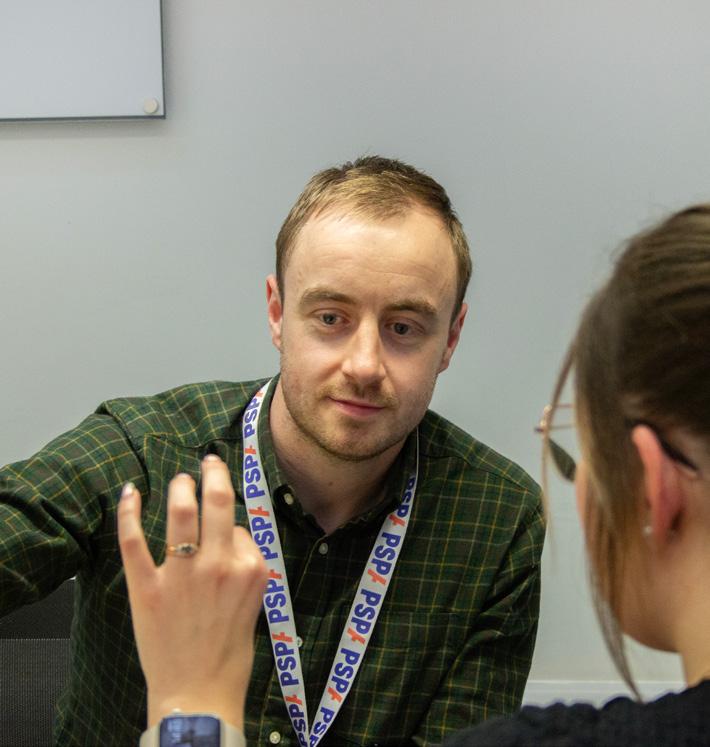
FUND
• Both our small and project grants are open to applicants at any career stage
• Specific research fellowships funded since 1997 and a new one will be starting in September 2026
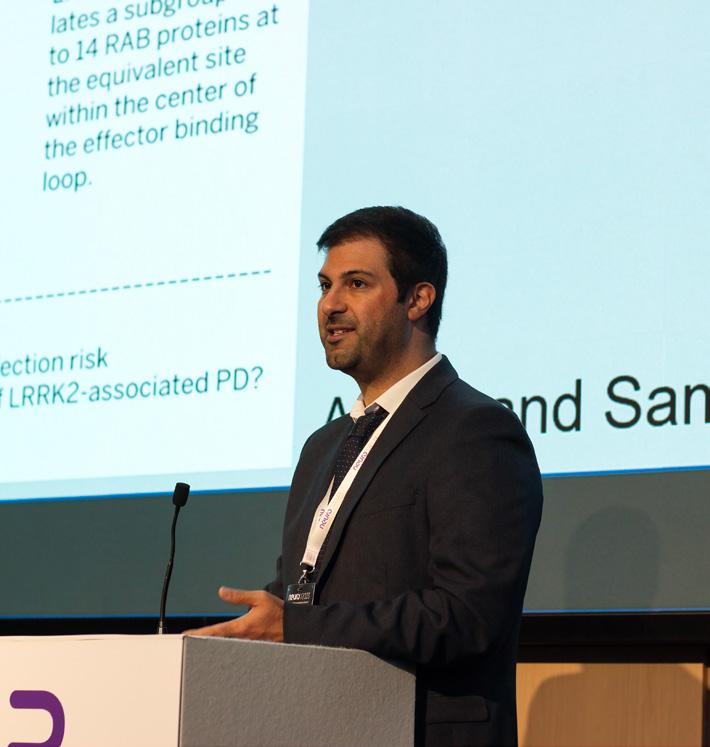
SHOWCASE
• ECRs receive invitations to speak at our Research Information Sessions and support groups
• Invited speakers and poster opportunities at our International Symposium
• Highlighting their work and publications on social media and in newsletters
DR ROBERT DURCAN
PROFESSOR HUW MORRIS
DR EDWIN JABBARI
THE
PSPA IS DEDICATED TO SUPPORTING EARLY CAREER RESEARCHERS TO FLOURISH INTO THE NEXT GENERATION OF WORLD LEADING CLINICIANS AND ACADEMICS.
Our funding opportunities are open to researchers at all career stages, with both small grants and larger project funding available. Since 1997, we’ve also funded dedicated research fellowships that have launched the careers of several leading figures in the field.
One of the earliest was Professor Huw Morris, PSPA’s first Research Fellow in 1997. Under the supervision of Professor Andrew Lees and Professor Nick Wood, Professor Morris began investigating the genetics of PSP. He travelled to Guam to study a very similar condition to PSP, alongside Professor John Steele who was one of the first people to describe PSP as a medical diagnosis.
Professor Morris has since gone on to set up his own laboratory and movement disorders clinic in London and he leads the UK-wide PROSPECT study. He also mentors the next wave of researchers including recent PSPA Sara Koe Research Fellow, Dr Edwin Jabbari.
Since his fellowship Dr Jabbari has gone on to conduct his own research via a PSPA Project Grant where he has been working to develop seeding assays as a diagnostic test for PSP & CBD. Recently on the back of this research, he has been awarded a £2.3 million Medical Research Fellowship. This prestigious award will support Dr Jabbari to set up his own laboratory at UCL where he can continue to advance his work on diagnostic tests for PSP, CBD and Parkinson’s disease. Alongside his research work, he has also been made an honorary Consultant Neurologist at the National Hospital for Neurology and Neurosurgery.
Similarly, Dr Uma Nath, who began as a PSPA Research Fellow in 1999, now leads the movement disorders service at Sunderland Hospital. Back in 1999 she was introduced to PSPA founder, Michael Koe at a PSPA Research Event. Michael invited Dr Nath to conduct a fully funded prevalence study, which highlighted it was taking people on average four years to get a diagnosis.
Our current Research Fellow, Dr Robert Durcan at the University of Cambridge, is exploring a chemical called noradrenaline. It’s the brain’s natural form of adrenaline, our ‘fight or flight’ hormone. Noradrenaline is necessary for many aspects of thinking and behaviour and is produced in a small area in the base of the brain called the locus coeruleus. This bit of the brain is badly damaged by PSP where faulty tau builds up early, causing up to 90% of this region to be lost in the final stage of the illness.
It is thought that damage to noradrenaline production causes personality changes such as increased apathy and impulsivity. This project will investigate how noradrenaline production differs between people with PSP and what symptoms they experience, as well as if a repurposed ADHD medication called Atomoxetine can help apathy and impulsivity.
PSPA is dedicated to supporting early career researchers to flourish into the next generation of world leading clinicians and academics. Some of the money raised by the Understood Appeal will fund a new research fellow in 2026, as well as other research grants, ensuring we continue to develop the next generation of PSP & CBD researchers to develop new treatments for both conditions, and, one day, we hope a cure.
TOGETHER ON THE PATHWAY TO PROGRESS
The PSP & CBD community has come out strong in support of our Pathway to Progress events. With 16 events organised so far, and nearly 1,300 miles walked collectively, the community has already walked the entire South West Coast Path – twice over! From local hills and scenic trails to international routes, walkers have so far raised over £31,000 for PSPA. Here are some of the moving and remarkable people who are powering our Pathway to Progress.
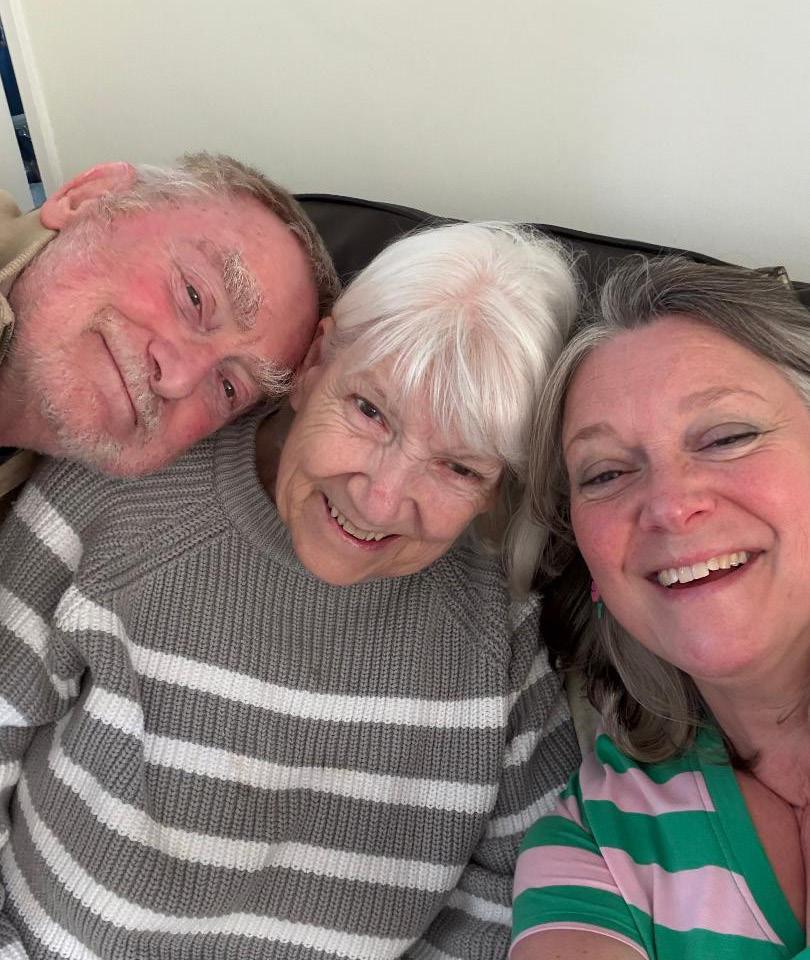
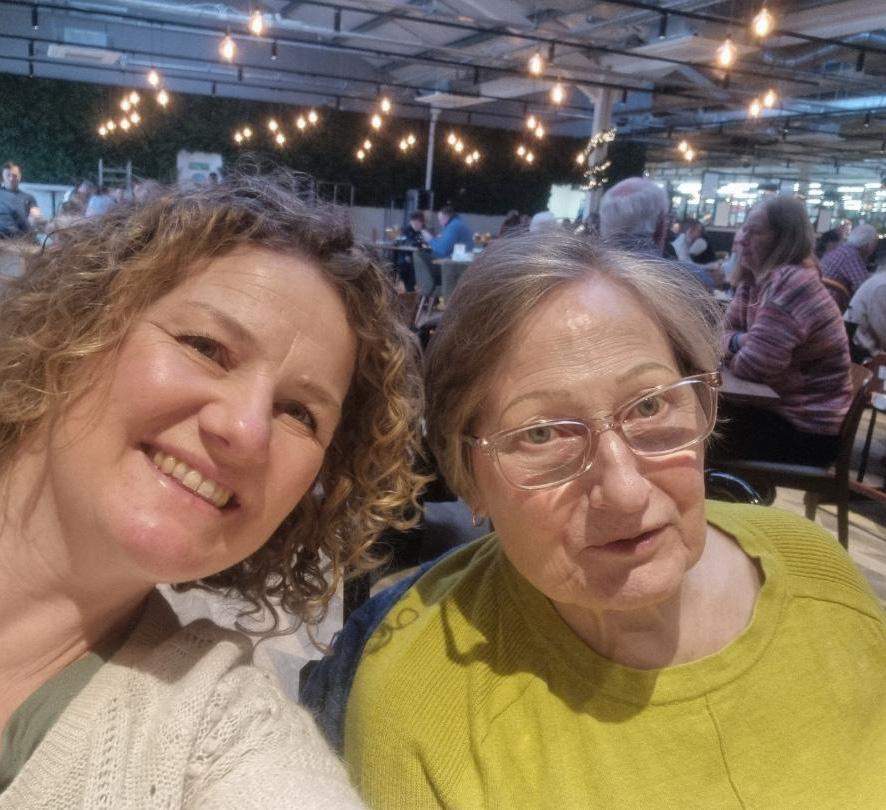
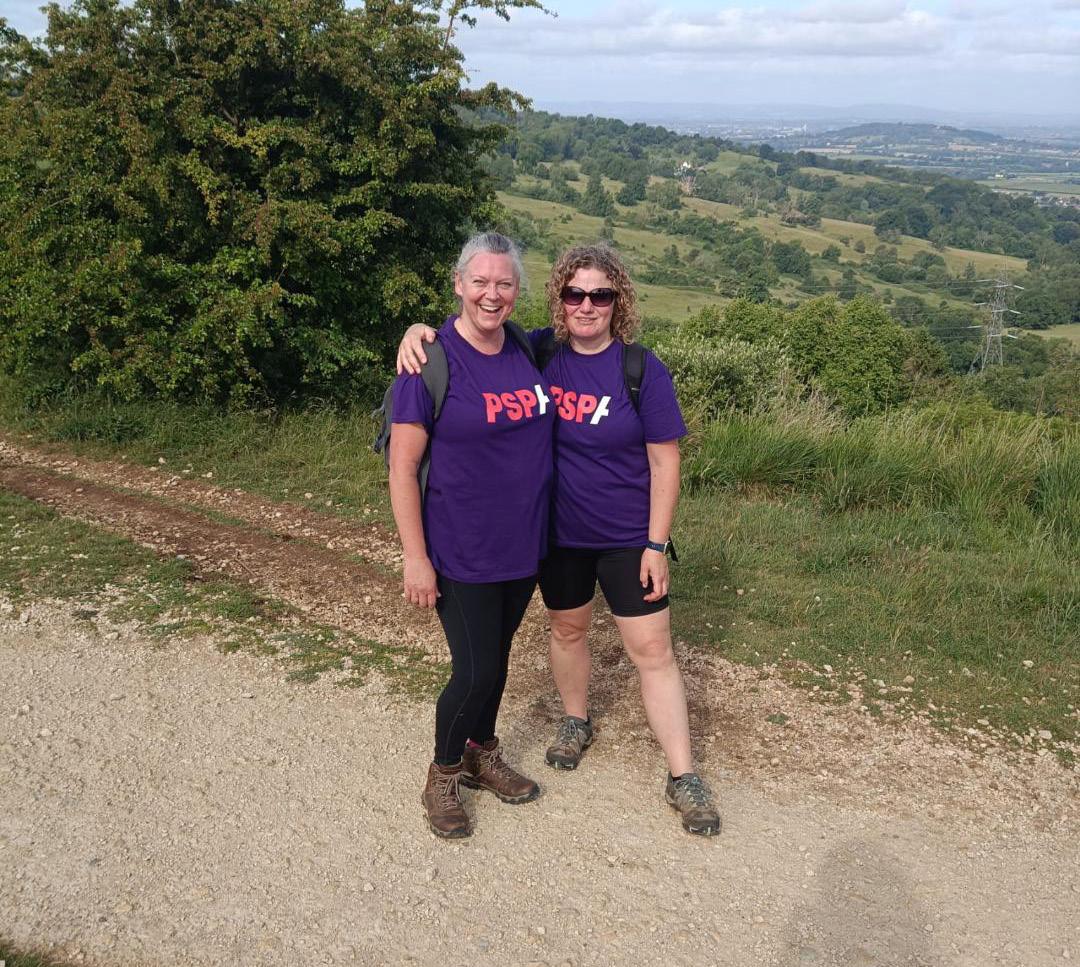
“FOR OUR MUMS”
Natalie Kendall and her close friend Carol Hannam are walking in tribute to their mums. The friends, who have known each other for over 20 years, decided to take on the 22-mile circular walk of Cheltenham’s Three Hills, as Natalie explains.
“Around three years ago, Carol’s mum, Isobel, was diagnosed with CBD, and my mum, Helen, with PSP. It was incredibly strange given how rare both diseases are.
“We’ve always loved walking, and we decided to tackle the Cotswold Way in sections. During those walks, we talked about everything—our mums’ symptoms, our dads’ experiences as carers. Sometimes we cried, sometimes we just hugged it out on a farm track.
“We both agreed that we felt helpless and decided then that we would try to raise money for PSPA. We’re not daredevils, just two busy mums wanting to try to help, so we decided to do what we love and walk.
“We knew the walk would need to be a challenge so we did some research and found a circular route of Cheltenham that takes in its three big hills - Crickley,
Leckhampton and Cleeve. Walking 22 miles and three big hills seemed like a good level of challenge!
“We trained over a few months, battling cows, nettles, and some serious inclines! We originally aimed to raise £500, then raised it to £1,500. By the day of the walk, we had hit over £2,000 which blew us away!
“At 6.30am we set off. The last two miles were a real push. Our feet were sore, our faces a little pink from the sun and we were ready for a rest. We pushed through, kept on walking and eventually clocked up 22 miles and reached our start point which incidentally was a pub, so we happily sat with a pint of soda water each and a pint of craft ale.
“We were so proud of ourselves and had a real sense of achievement. What’s more, knowing that our event qualified for the Pathway to Progress initiative and that our 22 miles would help toward that total, really helped to make us feel part of something bigger and that we were able to make a difference in our own small way. PSPA and in particular the local support group, has been a real help to our dads. Listening to the experience of others and sharing information about what support is on offer has been really helpful.”
NATALIE WITH HER MUM AND DAD
CAROL WITH HER MUM
NATALIE AND CAROL DURING THEIR FUNDRAISING WALK
TEAM BASEMENT’S INTERNATIONAL SALT PATH
From Australia to Belgium, and Indonesia to the UK, Team Basement—a worldwide fan club of actor Jason Isaacs—took their support global.
Inspired by Isaacs’ role in the film, the group decided to walk the 630 miles of the South West Coast Path from their own countries. In May, some of the Team members were lucky enough to meet Jason in France to promote their walk for PSPA. Deb Green, one of the organisers explains why they wanted to get involved.
“We wanted to fundraise for Jason’s birthday in June. When we saw his role in The Salt Path, it felt like the perfect cause to support. We all loved the book and we thought it would be nice to link our fundraising with the film release.”
“We collected photos, shared our routes, and encouraged one another. We even launched the walk in Metz, France, where some of us met Jason himself! It was a very fun way to work together to raise money and see each other’s countries.
“We felt so welcomed by PSPA staff—Amber and Helen were wonderful. It reminded us that although this is a small charity, it’s making a mighty difference. We were originally inspired by Jason's role in the film, but we were then driven by the hope PSPA gives to so many. We intend to remain in contact with PSPA to continue our support.”
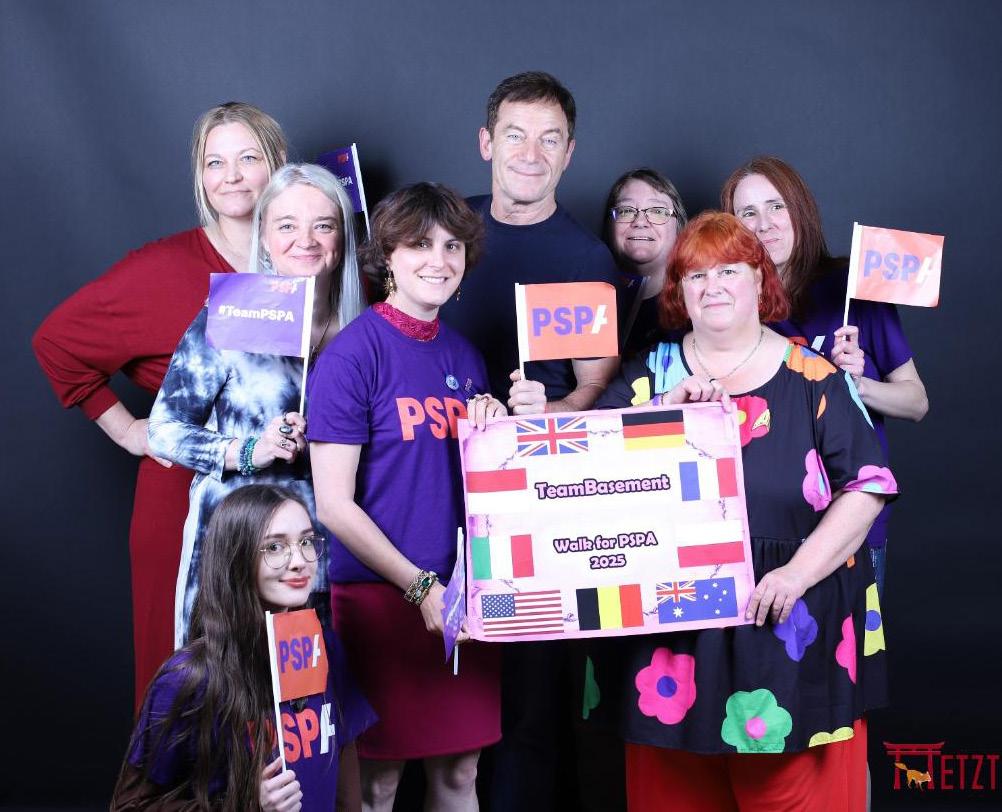
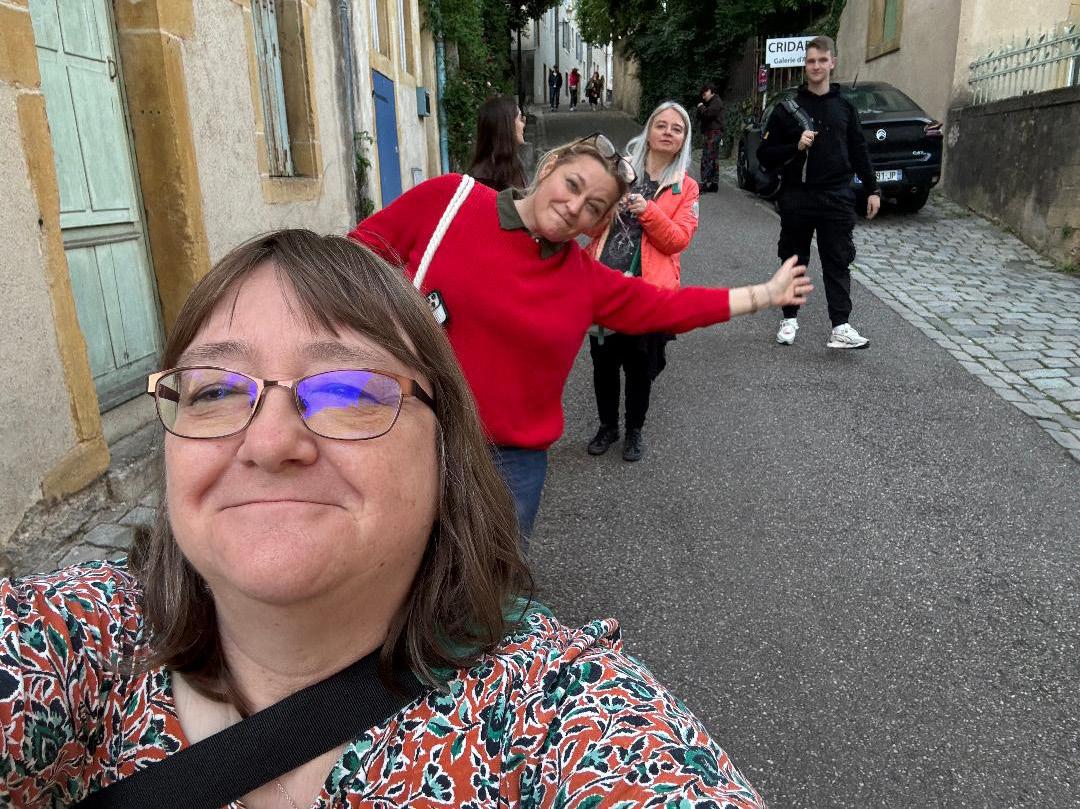
“WE WANTED TO FUNDRAISE FOR JASON’S BIRTHDAY IN JUNE. WHEN WE SAW HIS ROLE IN THE SALT PATH, IT FELT LIKE THE PERFECT CAUSE TO SUPPORT."
DEB GREEN
TEAM BASEMENT WITH JASON ISAACS
A 70TH BIRTHDAY TO REMEMBER
Turning 70 this year, Leslie Ferrar, wanted to do something that would make a difference to others. Alongside her husband David, she set out to walk 630 miles before the end of September, inspired by The Salt Path and in tribute to her Aunt Beth who was diagnosed with PSP last year. Their efforts have already raised over £14,000 toward their £15,000 target, with hopes of reaching even more by the time Leslie’s birthday arrives later this summer.
Together, they’ve taken their challenge across borders and back, walking in multiple countries and locations, often joined by friends and family.
Leslie said: “I wanted to mark this milestone with something meaningful. When I heard about the Salt Path walk, it just felt absolutely right.
“Luckily my husband David agreed as he is doing the walking with me! It is such an original way of raising money and it was really inspirational. It felt right in every way for me.
“I have some incredibly generous friends who understood what I was doing and why. I think they think if I’m mad enough to walk 630 miles then they should support it. I’m also trying to do some of the walk with some of my close friends and family. I hope it helps raise awareness of PSP and it’s nice to get my friends involved.
“So little is known about PSP. Anything I can do to fund research and help others avoid this hardship— well, it’s worth every step.”
THANK YOU
Every person who has walked, donated, or supported Pathway to Progress is part of something bigger: a growing, determined movement that’s stepping up to raise awareness and fund hope.
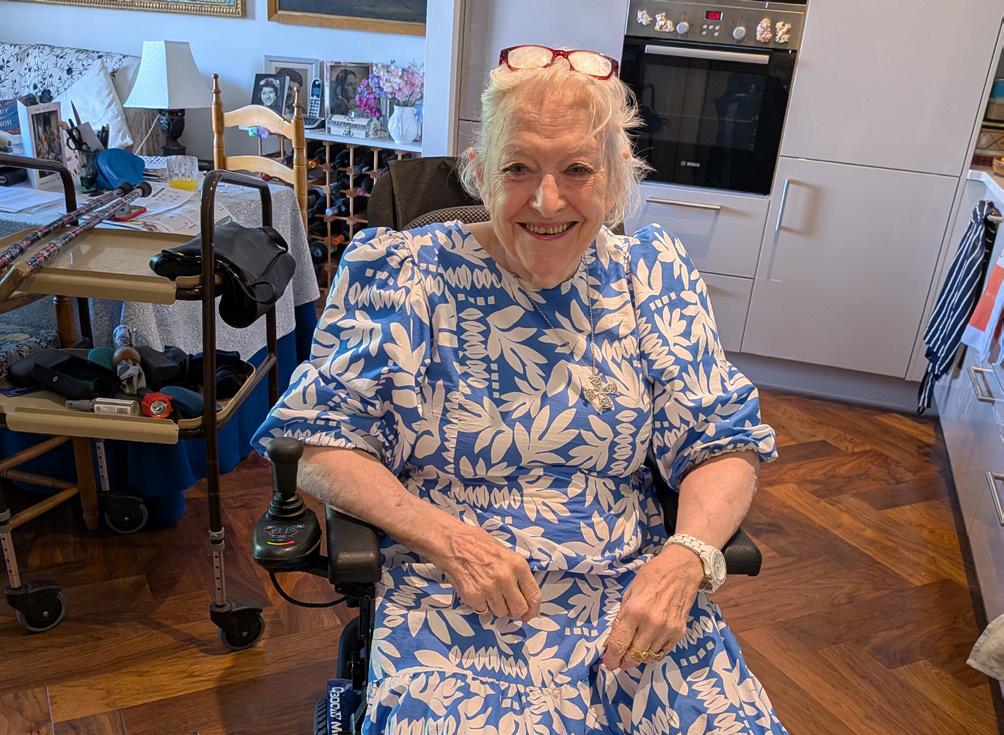
AUNT BETH
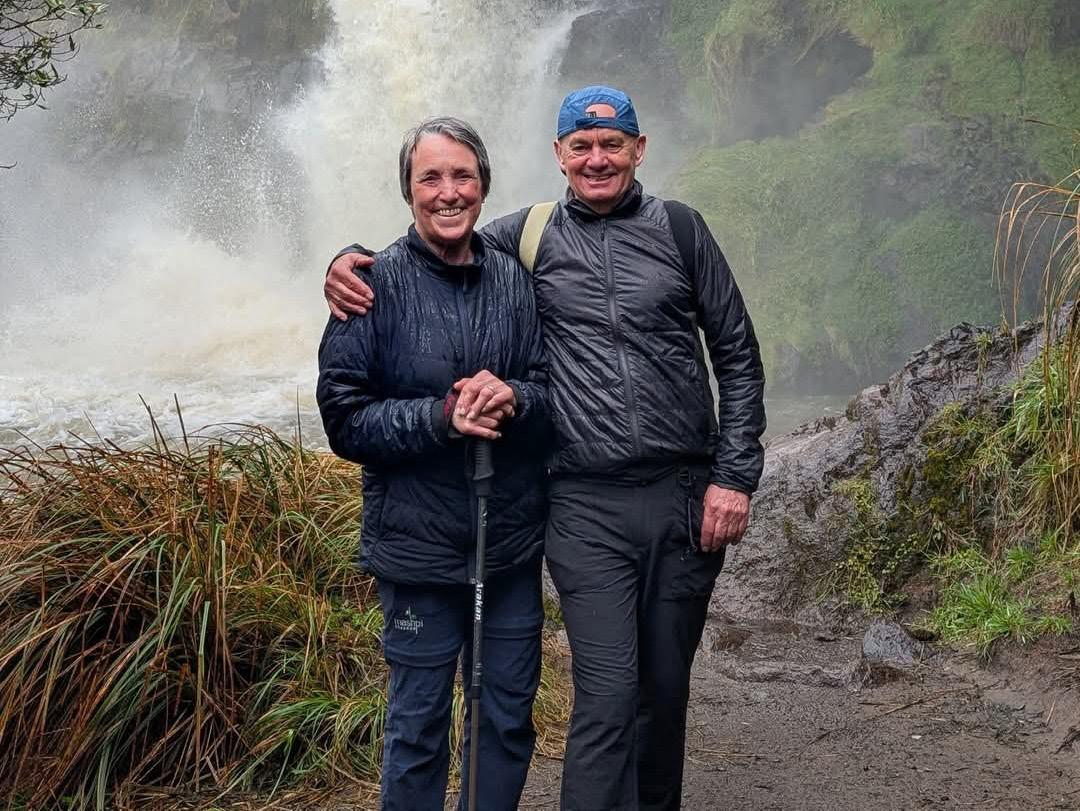
DAVID
“SO LITTLE IS KNOWN ABOUT PSP. ANYTHING I CAN DO TO FUND RESEARCH AND HELP OTHERS AVOID THIS HARDSHIP - WELL, IT’S WORTH EVERY STEP.”
STILL TIME TO JOIN THE JOURNEY
Pathway to Progress is continuing through 2025 - and there’s still time to get involved. Whether it’s a short family stroll, a long-distance hike, or an international adventure, every mile counts.
Scan the QR code or visit www.pspassociation.org.uk/pathway-to-progress
LESLIE'S
LESLIE AND HER HUSBAND
SPOTLIGHT ON PSPA SERVICES
Supporting the emotional journey - PSPA Counselling Service
In May 2024, we launched our Mind, Body and Soul service, made possible by a grant from the National Lottery Community Fund. Central to this offering is a professional counselling service delivered in partnership with Rareminds—a specialist organisation whose experienced and registered therapists are trained specifically in the psychological and emotional complexities that come with living with a rare disease.
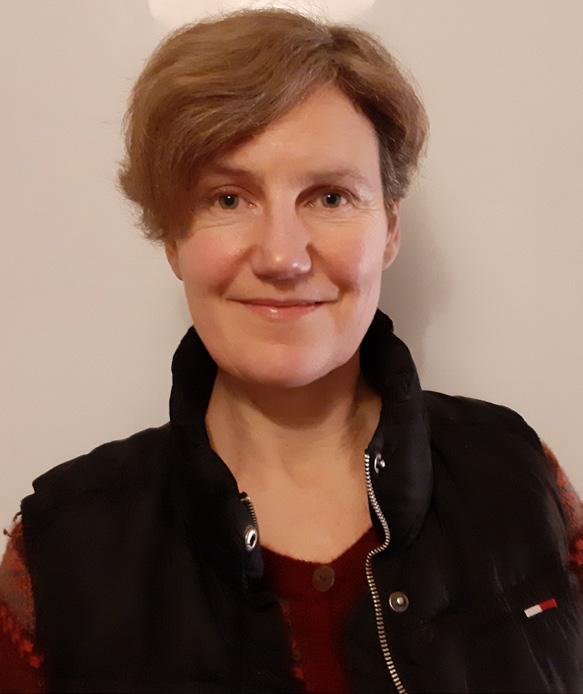
Navigating life with PSP or CBD can be emotionally complex. The impact is not only physical but also emotional and social, often affecting relationships and family life. As one person explains: “I feel that having counselling helped me to accept my condition and gave me a good opportunity to talk about how I feel and how it affects me and my family.”
Open to people living with PSP or CBD, their carers and family members over the age of 18, the counselling service offers between 6 to 12 sessions, delivered either via Google Meet or by telephone.
The aim is to provide a flexible, supportive space to talk openly about difficult feelings and explore strategies to cope with the many uncertainties PSP & CBD can bring. One person said: “The counselling sessions really helped me to process my thoughts and challenged me to think outside of my own thoughts at times.”
The emotional toll of living with PSP or CBD can be significant—not just for the person living with the condition but for those closest to them. Whether it’s managing daily symptoms, coping with feelings of isolation, or trying to maintain relationships and employment, having a safe space to talk, explore emotions, and develop strategies for resilience can be very valuable.
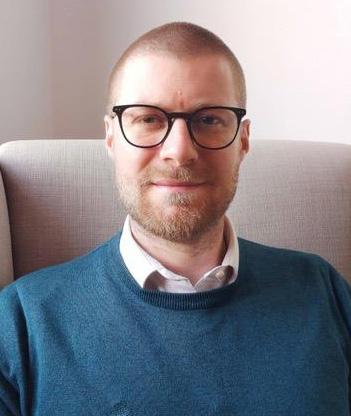
WHAT CAN COUNSELLING HELP WITH?
• The impact of PSP or CBD on family, work, and relationships
• Feelings of anxiety, low mood, or depression
• A changing sense of identity, including feelings of loneliness or isolation
• Coping with complex or unpredictable symptoms
• The burden of feeling like you have to be the “expert” on your condition
• Fears about the future and what it may hold.
Counselling provides a vital space where deeply personal fears—especially those related to the progression of the condition and future dependency— can be expressed and explored. With support, individuals may find it easier to talk about these concerns with healthcare professionals or loved ones, or to simply feel more able to face uncertainty.
This initiative is part of our wider commitment to supporting the person living with PSP or CBD, as well as their family and friends. By addressing the mental and emotional wellbeing of those affected by PSP & CBD, our Mind, Body and Soul service reflects a holistic approach to care that is both compassionate and empowering.
If you are interested in our Counselling Service, please contact our helpline on 0300 0110 122 or email helpline@pspassociation.org.uk
PSPA COUNSELLORS POPPY AND DAVID
MY PILGRIMAGE FOR LINDA
BY DAVID CARTER
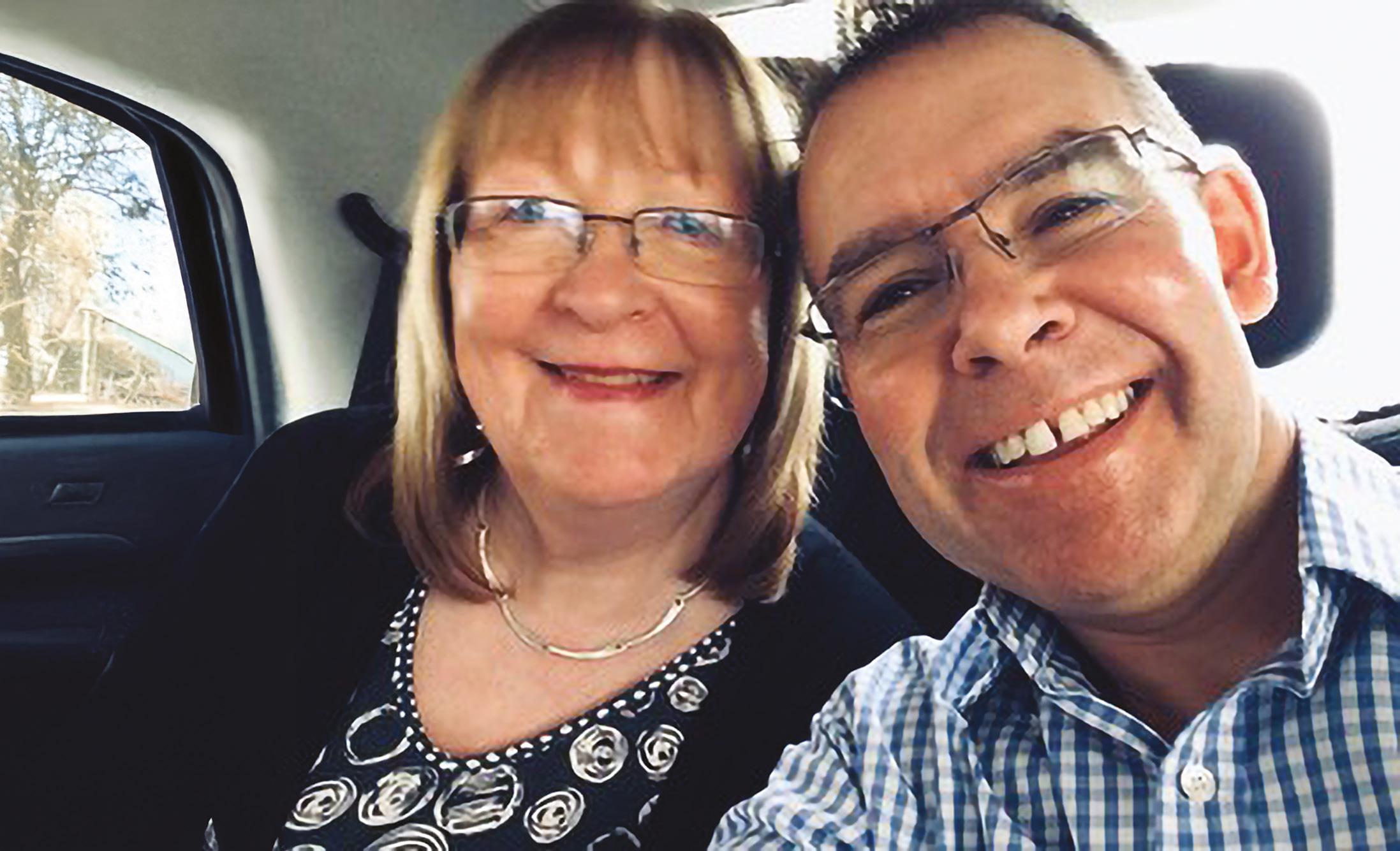
This year I completed the final two legs of what I’ve come to call my Pilgrimage Triangle – a trio of endurance challenges motivated by love, loss and the need to keep moving forward.
IT BEGAN WITH A BOOK
The first Christmas after losing Linda, her stepdaughter sent me a copy of The Salt Path, which I couldn’t put down. I knew I needed some sort of challenge or goal to help me move forward.
Linda died in October 2023. We’d been together for 21 years. She was my soulmate, my wife and my best friend. I became her full-time carer from the beginning of 2020, as PSP was taking away her balance, speech, swallowing and ultimately, her life.
After her death, the world went quiet. I’d spent years increasingly caring for her. Suddenly I was alone with the heavy weight of everything we’d lost.
The book lit a spark. To help process my grief I began walking the South West Coast Path, a 630-mile trail from Minehead to Poole. My objective was to complete my pilgrimage in 58 days from April to June in 2024, to match the same number of days Linda survived without food in her final months. It felt powerfully symbolic to me that my own physical and mental challenge mirrored as much as possible Linda’s incredible strength as she progressed through her dreadful illness.
At first I often had to force myself to leave the house to complete the necessary preparation training. I bought a tent and camping equipment. I had to get used to setting up camp at the end of long, exhausting days. But remarkably, not once did I have to pitch or take down my tent in the rain. Whenever the heavens opened, I was under a protective tree canopy, or next to a bus shelter if I was passing through a village. Ferries were never missed and often caught by minutes. Everything aligned - as though Linda was walking beside me, shielding me.
DAVID AND LINDA
THE SECOND LEG: WAINWRIGHT’S COAST-TO-COAST
In May I completed a 14-day trek across England on Wainwright’s iconic Coast-to-Coast Walk – 192 miles from St Bees on the Irish Sea to Robin Hood’s Bay on the North Sea. I extended it to 206 miles by climbing Scafell Pike on day three.
Averaging 15 miles a day through the Lake District, the Yorkshire Dales and the North York Moors. Being out in the wild – just me, my pack, and a compass – once again became my therapy.
THE FINAL CLIMB: KILIMANJARO
In September, I’ll be scaling Africa’s tallest mountain, Mount Kilimanjaro. At 5,895 metres, it’s the highest peak in Africa. I’ve never done anything quite like this before, particularly with the extreme altitude involved. But after hearing about friends who had climbed both Kilimanjaro and Everest Base Camp, I thought why not. Linda wasn’t a climber or hiker, but she supported me in everything. I know she would be proud. By the end of the Pilgrimage Triangle, I’ll have walked 875 miles and ascended 168,102 feet – the equivalent of climbing Everest nearly six times. That number sounds impressive, but it still pales in comparison to the strength Linda showed every day battling PSP.
MORE THAN WALKING
My journey is about more than walking. I wanted to raise money for the Understood Appeal and awareness of PSP. Misdiagnosis is so common. Linda was initially thought to have Multiple System Atrophy or a form of Parkinson’s. With better research and earlier diagnosis, we could’ve had more time –better time.
I want to change that for others. I want to help people living with PSP. On all of my walks, I’ve shared Linda’s story with people I meet. Many of the walkers I spoke with donated on the spot after hearing about her which I found profoundly moving.
Grief doesn’t disappear. You don’t move on – you move forward. Walking helps. I talk to Linda often when I’m out walking. I see signs; a rabbit that keeps crossing my path, a squirrel that won’t leave me alone, a shaft of sunlight breaking through at just the right moment. I believe Linda is still with me. Nudging me on. Watching over me. Since her death, I’ve cleared out the house, sorted through a life lived together.
Walking has become my therapy, my way of making sense of everything. And if by doing this I can raise awareness, fund research and help even one family –then every mile is worth it.
But, still through this journey of remembrance and resilience, I will have only touched the surface of what those living with CBD & PSP - and their families go through.
This is why I am raising funds for the PSPA Understood Appeal which aims to improve diagnosis and offer more consistent care. This is the key to finding treatments and a cure.
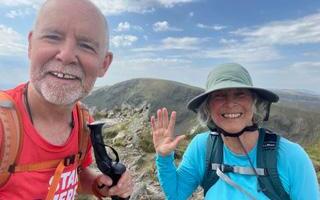

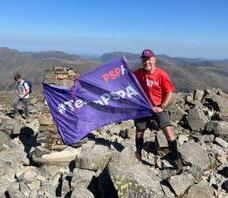
"MY OBJECTIVE WAS TO COMPLETE MY PILGRIMAGE IN 58 DAYS, TO MATCH THE SAME NUMBER OF DAYS LINDA SURVIVED WITHOUT FOOD IN HER FINAL MONTHS."
JUSTGIVING
If you would like to help David raise money for PSPA just scan the QR code to visit his JustGiving page.
WHY PSP & CBD ARE HARD TO DIAGNOSE
BY DR BOYD GHOSH, CONSULTANT NEUROLOGIST, UNIVERSITY HOSPITAL SOUTHAMPTON
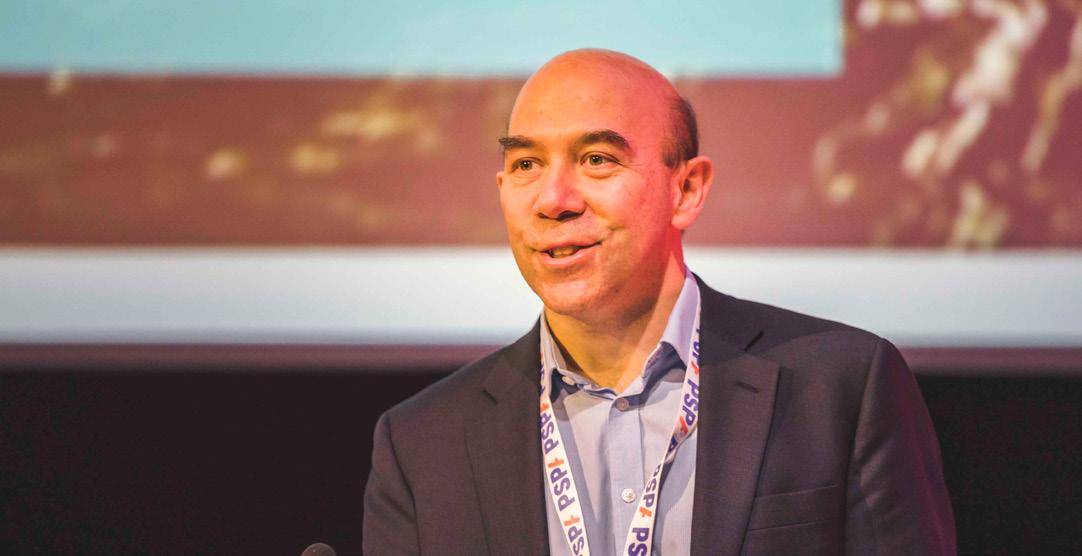
There are no single tests for Progressive Supranuclear Palsy (PSP) or Corticobasal Degeneration (CBD). This means doctors can't rely on a simple blood test or scan. Instead, they must carefully evaluate a person's symptoms, use brain scans, clinical evaluation, and rule out other possible conditions. This process can be long and frustrating, and many people wonder why it takes so much time.
Here, I'll explain some of the reasons why these conditions are so challenging to diagnose.
THE DIFFERENCE BETWEEN CORTICOBASAL SYNDROME (CBS) AND CORTICOBASAL DEGENERATION (CBD)
Let’s consider John, who has developed worrying symptoms. He would like to know what in his body is going wrong and what can be done about it. His doctors will listen to how the symptoms developed, examine him to see what he can and can’t do and use brain scans and other tests to try to work out what is wrong. However, the only way to know exactly what is happening is to do a brain biopsy to work out what disease process is affecting the brain. However, conducting brain biopsies on living people is risky and can cause more problems like strokes, so we don’t do them unless we really must.
In the case of CBS, it is a disease that can affect various functions including movement affecting one side of the body first. Despite people having good muscle power in the arms, people can’t use their arms and hands appropriately, so it means actions are clumsy. These set of symptoms are called CBS by doctors. It is important to note that this term CBS is not describing the actual pathology in the brain but is describing the collection of symptoms the patient
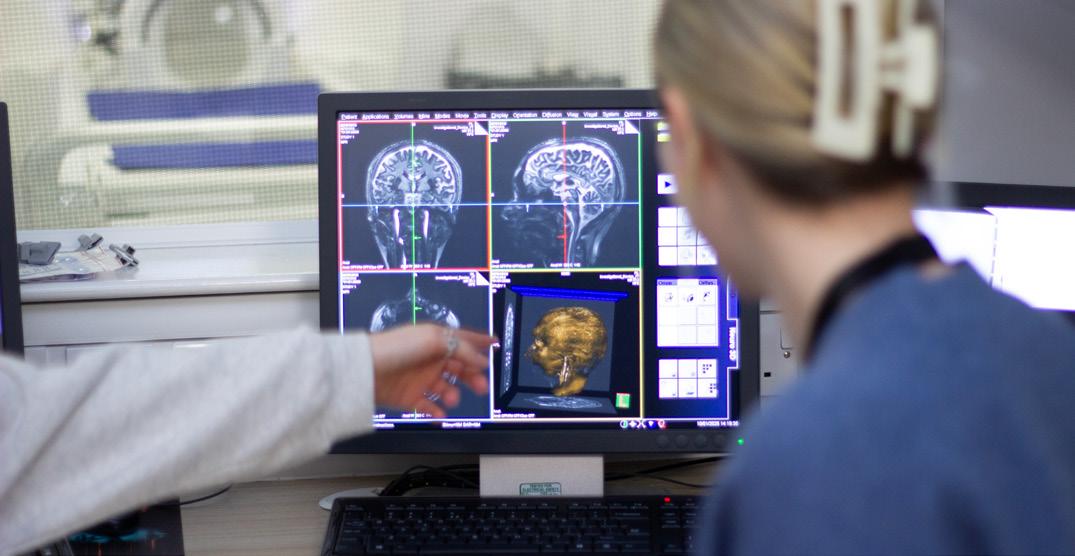
is experiencing as assessed by the doctor from largely non-invasive tests.
The reason why people have this collection of symptoms is because a disease process has affected the brain, including a part called the parietal lobe, and caused it to shrink. Any disease process affecting these parts of the brain may cause this set of symptoms which we describe as CBS.
If we were to take a small sample of the brain affected by this disease and look at it under a microscope, then we would be able to see clumps of protein in the cells affecting their function. Different types of protein or different shapes that the abnormal protein make are described as different diseases.
PSP OR CBD?
A particular distribution and shape of the protein tau might be described pathologically as Progressive Supranuclear Palsy (PSP) and a slightly different distribution and shape of tau is described as CBD. Equally other distributions of the protein tau seen together with a protein called amyloid beta is the pathological description of Alzheimer’s disease. Sometimes what is described pathologically relates very closely to the symptoms the patient experiences like in PSP. However, this isn’t always the case, for example not all people experiencing memory problems have Alzheimer’s disease pathology.
There are many different types of pathology that can cause shrinkage of the brain, including the parietal lobe, and can cause the particular collection of symptoms that doctors call CBS. The main pathology that can affect the brain in this way is the pathology described as CBD, which is why CBS is often referred to as CBD. However other
John
DR BOYD GHOSH
pathologies can also affect the brain in this way including Alzheimer’s disease pathology, PSP pathology and others.
DIFFERENT PATHOLOGIES MAY AFFECT
DIFFERENT PARTS OF THE BRAIN
Different pathologies in the brain may tend to spread to different parts of the brain depending on what they are. Alzheimer’s pathology for example may spread to the memory centres of the brain, so we might expect people with that pathology to have memory problems in the future. PSP pathology may spread to parts of the brain that control eye movements and so people with that pathology may have difficulty moving their eyes in the future. Other pathologies may affect other aspects of function or may stay confined to a particular part of the brain. Different pathologies can also spread or affect the brain at different rates. Some pathologies may cause people to deteriorate relatively quickly and
WHAT IS PATHOLOGY?
others may mean that people don’t change much at all over many years.
Our patient John wants to know what pathology is affecting his brain, if there are any treatments that he would benefit from, what other symptoms he will develop and how quickly he will get worse. Unfortunately, we can’t tell him what pathology is affecting his brain as we can’t do that without a brain biopsy, at least while he is alive. However, we can describe his collection of symptoms as CBS. We can also share descriptions about how people with CBS tend to develop symptoms on average, how quickly they deteriorate on average and the kinds of treatments that might help them with their symptoms. We can’t though be more specific about how their disease will progress until we know about their pathology.
Pathology is the scientific study of what causes a disease. By examining blood and tissue samples, doctors can understand the root cause of a problem, which helps them make a diagnosis and plan the right treatment.
THE DIFFERENCE BETWEEN CORTICOBASAL SYNDROME (CBS) AND CORTICOBASAL DEGENERATION (CBD)
• Corticobasal Syndrome (CBS) is the term doctors use to describe a specific collection of symptoms. For John, these might include clumsy movements on one side of his body, even though his muscles are strong. Doctors identify CBS by listening to a patient and doing physical exams and brain scans.
• Corticobasal Degeneration (CBD) is the name of the actual disease or "pathology" in the brain that causes these symptoms.
THE HOPE FOR THE FUTURE
HOW DISEASES CAUSE DIFFERENT SYMPTOMS
Different diseases are caused by different proteins clumping together in brain cells.
• A specific shape of the protein "tau" is linked to PSP
• A slightly different shape of "tau" is linked to CBD.
• Other proteins, like "amyloid beta," can cause Alzheimer's disease
The symptoms a person experiences often depend on where in the brain these abnormal proteins spread. For example:
• Alzheimer's disease often affects the parts of the brain that control memory.
• PSP often affects parts of the brain that control eye movements.
Today, we can't tell a patient like John exactly what disease is affecting his brain while he is alive. However, there is great hope for the future. Researchers, including PSPA-funded scientists, are developing tests that can look for specific proteins like tau in spinal fluid and blood. These new tests could one day allow us to:
• Make a precise diagnosis without a risky brain biopsy.
• Give patients and their families more specific information about their condition.
• Help drug companies develop targeted treatments for each specific disease.
Until then, PSPA continues to support everyone with CBS & PSP, no matter what their underlying pathology is or how their symptoms progress.
RUNNING FOR A REASON
As thousands of runners lace up their trainers for two of the UK’s most iconic runs – The Great North Run and the Royal Parks Half – many members of #TeamPSPA are aiming for more than personal bests.
Among them are Martin and Katie Burnside, a father-daughter team running the Great North Run in memory of Janet Burnside, beloved wife and mum, who died from PSP in November 2024. And in London, James Noble is preparing to take on the Royal Parks Half Marathon in memory of his mother-in-law. A former Trustee of the charity, James has spent nearly a decade championing its cause.
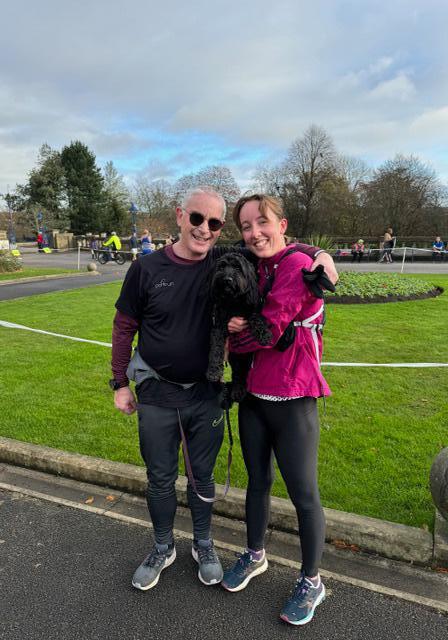
MEET MARTIN
“I started doing the Great North Run back in 2000 with a group of five or six mates. It became a bit of a tradition, but I haven’t done it for five years. This year, Katie and I are running for PSPA—because this one’s for Janet.
“She was first diagnosed with PSP in January 2022, but the symptoms started back in 2017. It took years to get answers. She was still running Parkrun in the summer of 2021, but then her balance just went. We had no idea what was happening—it was such a shock.
“From then until she died in November 2024, Katie and I looked after her, along with our youngest daughter. It was incredibly difficult. She died from aspiration pneumonia, which is common with PSP. Running had to take a back seat during those years.
“Before that, Janet and I used to run every Sunday—12 to 16 miles together. She was always active. Her first symptom showed up when she was just 50. Now, Katie and I want to run in her honour and raise money for PSPA.
“Janet wanted to help push forward research. She donated her brain and spinal cord to Queen’s College for research. That was important to her—she wanted to help others, even after all she went through. If she could do that, we can do this. Running is nothing compared to what people with PSP go through.”
"IT TOOK YEARS TO GET ANSWERS. SHE WAS STILL RUNNING PARKRUN IN THE SUMMER OF 2021, BUT THEN HER BALANCE JUST WENT. WE HAD NO
MARTIN AND KATIE
MEET KATIE
“I’m excited but emotional about running the Great North Run. It used to be this huge family event—my sister and I would come up with Mum and Dad, and all the cousins and aunts would be there. This year, it’s just me and Dad. Two of our aunts have died, and without Mum, it’ll feel very different.
“This is my third half marathon, but my first time running the Great North Run. I started running with Mum and Dad when I stopped swimming. I asked Mum what her fastest time was before my first race—she said 2 hours and 15 minutes. I ran it in 2:12 and was so proud. Then Dad found out later that her real fastest time was 2:07! I think she wanted me to think I beat her. So this year, in tribute to her I want to make her time of 2.07.
“Raising awareness is just as important to me as raising money. When Mum got her diagnosis, we were totally in the dark. Even healthcare professionals didn’t know much about PSP. I’ve tried to talk about it on social media, and someone recently reached out to me—they said their mum is going through it now too. We’ve connected and that means so much. We didn’t know anyone going through it back then. I want to be that support for someone else now.”
MEET JAMES
“This will be the third time I’ve run the Royal Parks Half Marathon, but the first time for PSPA. My mother-inlaw was diagnosed with PSP after initially being told it was Parkinson’s. When I met her in 2008, she already had symptoms. She died in 2018. After she received the PSP diagnosis she got in contact with PSPA who provided information and guidance, particularly around applying for Continuing Healthcare (CHC) funding and they sent her Prism glasses. She also attended a Family and Friends Day which she found very useful.
“PSPA is a small charity but I saw how important the support they offer is to families affected by PSP & CBD. I got involved with PSPA long before I became a Trustee. Back in 2015, I worked in the charity sector and offered some pro bono support—running workshops, helping the charity better understand how to make a difference to people and helping to develop a patient survey. In 2019, I officially joined the board and stayed on until this summer. It’s been nearly a decade of volunteering and supporting this charity. Even though my term is over, I want to still be involved.
“There’s a huge unmet need in PSP care and research. It’s under the radar and deeply inequitable.
Being part of PSPA is one way I can honour my motherin-law’s memory and keep pushing for better support for families like ours.
“On the running side—it’s partly about staying fit, partly about doing something meaningful. I haven’t started fundraising yet, but I’m aiming to raise at least £500.”
"BEING PART OF PSPA IS ONE WAY I CAN HONOUR MY MOTHER-IN-LAW’S MEMORY AND KEEP PUSHING FOR BETTER SUPPORT FOR FAMILIES LIKE OURS."
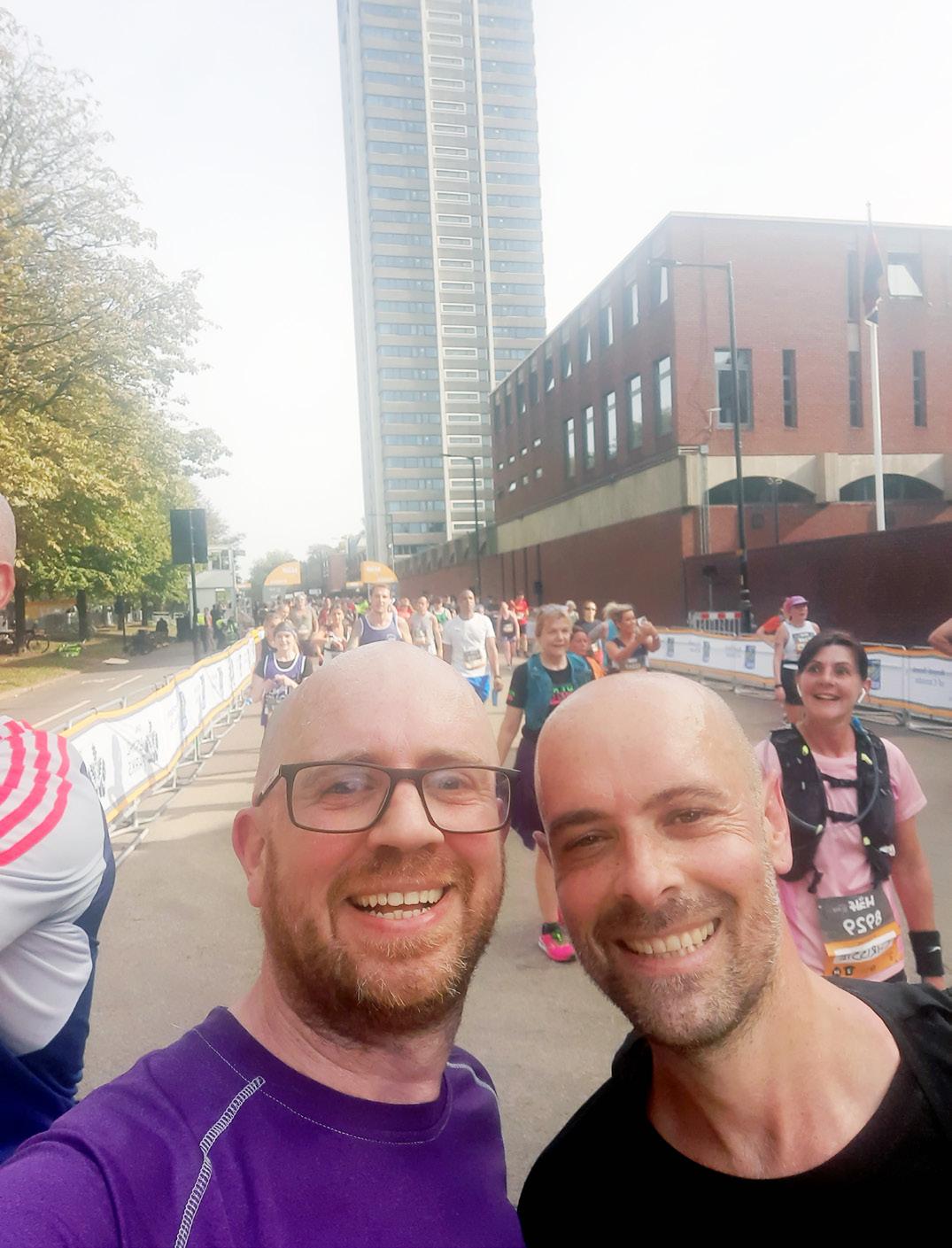
WANT TO TAKE PART?
If you want to run for a very important reason, visit www. pspassociation.org.uk/ fundraising/events/ to see a selection of events you can take part in; Or contact fundraising@pspassociation.org.uk for further running opportunities.
JAMES AND HIS RUNNING MATE STUART
WHAT LIFE LOOKS LIKE FOR PEOPLE WITH PSP & CBD
Results from the Neurological Alliance’s My Neuro Survey 2024 help provide vital insights into life with PSP & CBD and how people affected by the conditions feel about the care they are receiving.
Last year, we encouraged you to take part in the Neurological Alliance’s My Neuro Survey, the largest patient experience survey in the UK for people with neurological conditions – thank you to everybody who took part. The results, which were published in June, show the real life implications of living with PSP & CBD and highlight just how urgently better care and support are needed. Surveys like this (and our own PSPA survey) are vital to help inform care and provide the evidence needed for our campaigning activities to improve services across the country.
DELAYS IN DIAGNOSIS
Unsurprisingly, many faced a long and frustrating journey to diagnosis. The survey, which gathered responses from 249 people living with PSP & CBD, revealed that almost half (44%) waited between one and three years for a diagnosis. Shockingly, nearly one in five had to wait four to five years. These delays in diagnosis deprive people of timely access to the right treatment, services and emotional support at a time when they and their families are under significant stress.
IMPACT ON HEALTH AND DAILY LIFE
The majority of respondents reported challenges in key areas of health most associated with achieving the best possible quality of life. Movement (91%), communication (77%), fatigue (63%) and vision (53%) were among the most affected functions. Many also experienced difficulties with sleep, memory, bladder and bowel symptoms, and mental health.
These challenges have a huge impact on quality of life. Completing simple daily tasks, staying active and enjoying hobbies or social activities were difficult for the majority of those surveyed (80%). Relationships also suffer with 63% reporting how they struggle to maintain family ties, and 60% reporting a strain on romantic relationships. Over half (57%) had to give up work or study, and 52% faced financial difficulties. A third of respondents said they find daily life regularly or always challenging.
NAVIGATING THE HEALTHCARE SYSTEM
Accessing appropriate care is another barrier faced by people living with PSP & CBD. While most (76%) said they understood their condition and treatment options, just over half (56%) felt supported by the health system. Worryingly only 27% said they were happy with their experience of healthcare, with almost a quarter (33%) saying that it did not meet their needs.
Over half of respondents (59%) had a consistent health and social care professional so they don’t have to repeatedly explain their condition, sadly a significant 29% do not. And while 64% felt comfortable discussing mental health with healthcare professionals, only 10% said mental health services fully met their needs.
Use of healthcare services was high, with 74% reporting hospital visits. Almost half (49%) used emergency care at least once. Services such as speech and language therapy (91%), neurology (90%) and occupational therapy (85%) were widely used. Up to a quarter of respondents said these services didn’t meet their needs.
Moreover, critical services remain hard to access. Neuropsychiatry, inpatient neurorehabilitation and neuropsychology were cited as particularly difficult to reach, as were pain services, counselling and respite care. Just over half (56%) said they could easily access follow up appointments when needed.
SUPPORT SYSTEMS
The survey highlighted the importance of support networks. While 78% received some form of financial assistance, such as benefits or grants, only 30% accessed professional support funded by the NHS or local authorities, and 15% had to pay privately.
THE RESULTS, SHOW THE REAL LIFE IMPLICATIONS OF LIVING WITH PSP & CBD.
IMPACT ON HEALTH AND
■ Movement
■ Communication
■ Fatigue
■ Vision
LIVING CONDITIONS AND INCOME
Most people with PSP or CBD live with a partner (78%), but 11% live alone – highlighting the need for targeted outreach and support for those at risk of isolation. Financially, 21% of respondents lived in an annual income of under £20,000, compounding the stress of managing a complex health condition.
RESEARCH
Among those living with PSP & CBD, there is a strong appetite for research participation. The majority (81%) expressed interest in taking part in studies, and over a third have already done so. This shows a strong desire among people with PSP & CBD to contribute to better understanding and improved treatment options.
Thank you to everyone affected by PSP & CBD who completed the survey. The findings starkly underline gaps in diagnosis, care and support that we know from PSPA’s own work, and will inform how both PSPA and the Neurological Alliance work in future.
To build on the findings from My Neuro Survey and to ensure we have the most detailed, up-to-date feedback from our community, we are now conducting our own PSPA Survey – if you are living with PSP or CBD, or are a carer of somebody who does, you should have been sent an email inviting you to take part. Together, these insights will help inform better care and support, and will inform PSPA’s campaigning and influencing activities over the coming years.
■ Understand condition and treatment options
■ Felt supported by the health system
■ Happy with their experience of healthcare
■ Did not meet their needs
WHO COMPLETED THE SURVEY?
Of the 249 respondents, 91% were aged 65 and over, and almost half (48%) were over 75. The gender split was nearly even – 51% male and 49% female and most lived in England (86%), with 7% from Scotland, 5% from Wales and 2% from Northern Ireland.
“NOW I CAN GO BACK TO BEING A FRIEND”
Jane’s friendship with Sarah started with a dog. It was Sarah’s dog who she sadly had to rehome due to her declining health. Jane adopted the dog, and over a series of visits their friendship grew. As Sarah progressed with PSP, Jane was not just Sarah’s friend but her advocate and her support.
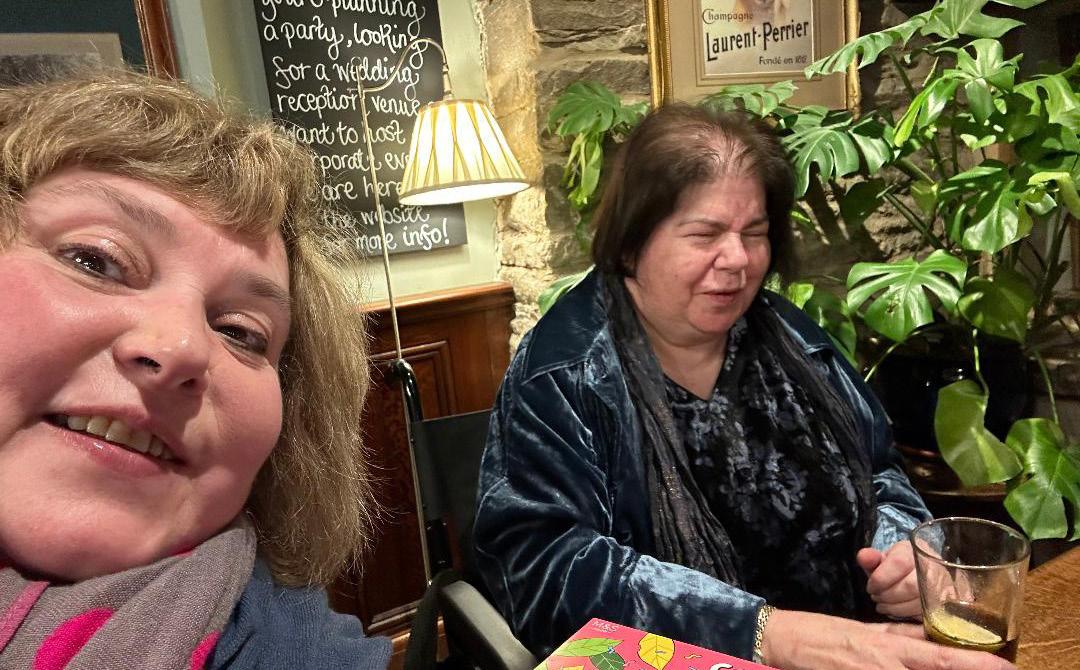
“Giving up her beloved dog was heart-breaking for Sarah,” Jane recalls. “But we became friends almost instantly. I loved her company. She was fiercely independent, a former university professor with a strong spirit.”
But in the years that followed, that spirit would be tested—not just by Sarah’s diagnosis of PSP, but by the harrowing experience they would both face navigating the care system. Sarah, now 66, lives at home with around-the-clock care funded by NHS Continuing Healthcare (CHC). Yet her biggest challenge wasn’t securing a care package—it was securing carers who were capable, understanding and consistent.
“I assumed once Sarah had CHC, things would be straightforward,” Jane says. “It was anything but. The problem wasn’t funding—it was the quality of care.”
What followed was a two-year ordeal of agency after agency failing to adequately meet Sarah’s needs. The first agency sent in carers for two brief visits a day, often young men untrained in the basics. “They couldn’t even fill a water bottle,” Jane says. “When Sarah needed more support, the agency couldn’t deliver and had to be replaced. I thought it would improve from there—it got worse.”
JANE AND SARAH
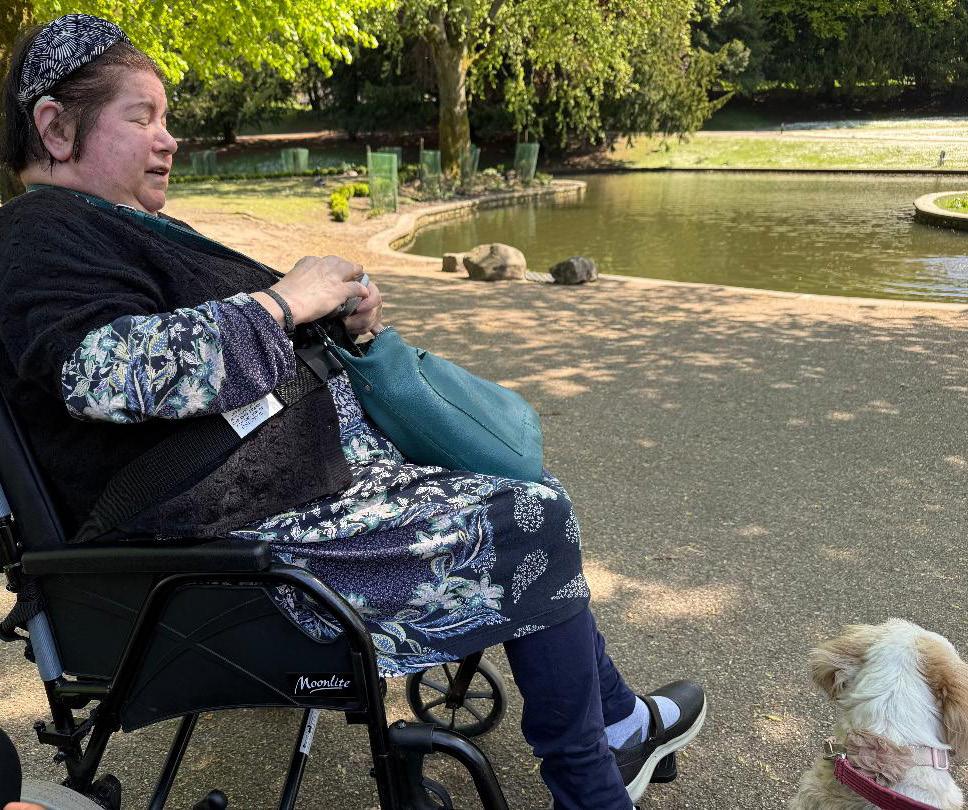
The next agency provided three visits a day, but the carers refused to cook, clean, or even light a fire. On several occasions, Sarah was left in distress, awaiting an ambulance alone. The pressure on emergency services mounted. Both Care Link and the ambulance service ultimately lodged complaints with the Care Quality Commission (CQC) due to the frequency and severity of the issues.
“I once heard a carer shouting at Sarah while I was on the phone with her,” Jane says. “It was heartbreaking. She was falling constantly. The emotional toll it took on her—and me—was immense.”
One day, the agency manager terminated their service during a meeting in Sarah’s home. By pure luck, Jane had already begun the process of finding a new provider. CHC arranged emergency weekend cover, and yet another agency took over.
Unfortunately, the problems didn’t stop. Carers seemed poorly trained, and the agency pressured for a live-in carer, against Sarah’s express wishes. “They kept calling me, treating me like I was part of the care team,” Jane says. “I told them again and again—I’m Sarah’s friend, not her guardian. I had to step back for my own mental health.”
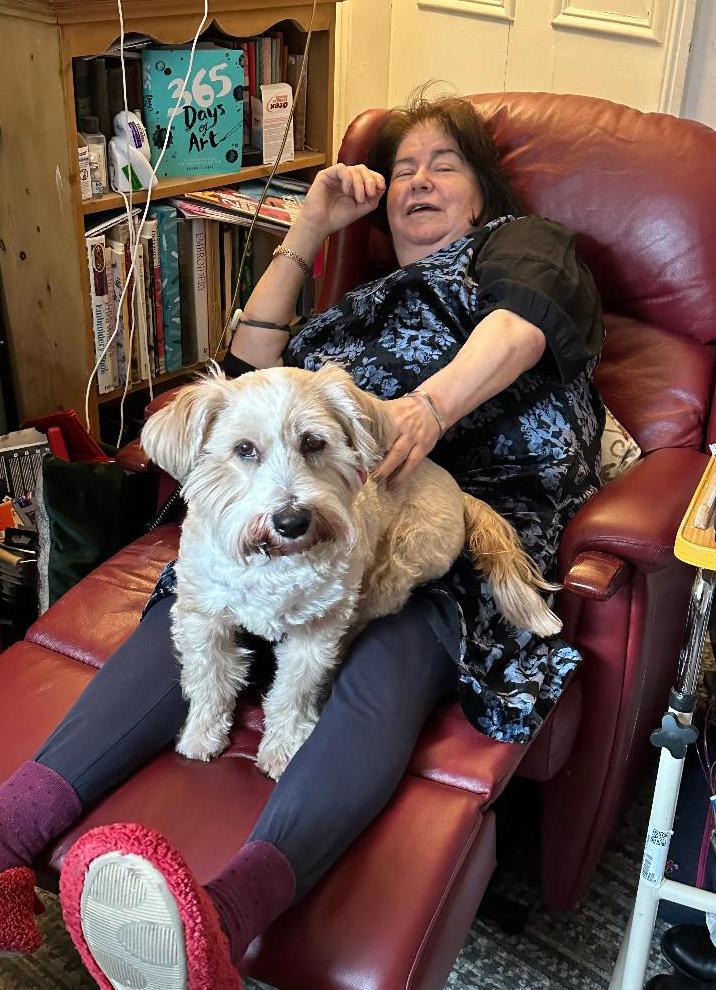
The agency ignored Sarah’s wishes and moved in a live-in carer. “She couldn’t cook. She just stayed upstairs. We found mouldy food in the fridge. She was feeding Sarah rotten cheese,” Jane says. “It was shocking.”
“I ONCE HEARD A CARER SHOUTING AT SARAH WHILE I WAS ON THE PHONE WITH HER, IT WAS HEARTBREAKING. SHE WAS FALLING CONSTANTLY.
THE EMOTIONAL TOLL IT TOOK ON HER —AND ME—WAS IMMENSE.”
SARAH OUT WITH JANE AND HER DOG
"THE STRESS SARAH EXPERIENCED TOOK A TOLL ON HER PHYSICAL AND MENTAL HEALTH. EVEN ROUTINE CHC REVIEWS BECAME DIFFICULT. "
Another live-in carer replaced her within a week. Again, untrained, unable to communicate, and unsupported. Finally, with persistent advocacy and support from the local hospice team, Sarah was connected with a reliable provider. She now has regular, trained carers who provide care in the day time and at night.
“These carers are different,” Jane says. “They clean, cook, and genuinely care. They engage with Sarah, not their phones. It’s the first time in years I’ve felt she was truly safe.” But the damage had been done.
“Throughout all of this, people kept saying, ‘Sarah’s so lucky she has CHC.’ But it didn’t feel lucky—it felt like we were fighting a system that cared more about budget than wellbeing.”
The stress Sarah experienced took a toll on her physical and mental health. Even routine CHC reviews
became difficult. “A stranger from CHC came to assess her, knowing nothing about her. The meeting was cancelled last minute, then moved to be a phone call —Sarah can’t speak for more than 30 seconds. When it did happen, it was an interrogation. It left her shaken.”
Jane, too, was left emotionally drained. “I still have counselling through the hospice,” she admits. “For a long time, every time my phone rang, my stomach would drop.”
Now that the care is working, Jane is able to go back to being Sarah’s friend. She said: “I’m grateful that every moment I spend with Sarah now is risk free. I hope the days of me driving to Sarah’s with my heart in my mouth, stressed at what crisis I was walking into are long gone. Now we can simply be friends.”
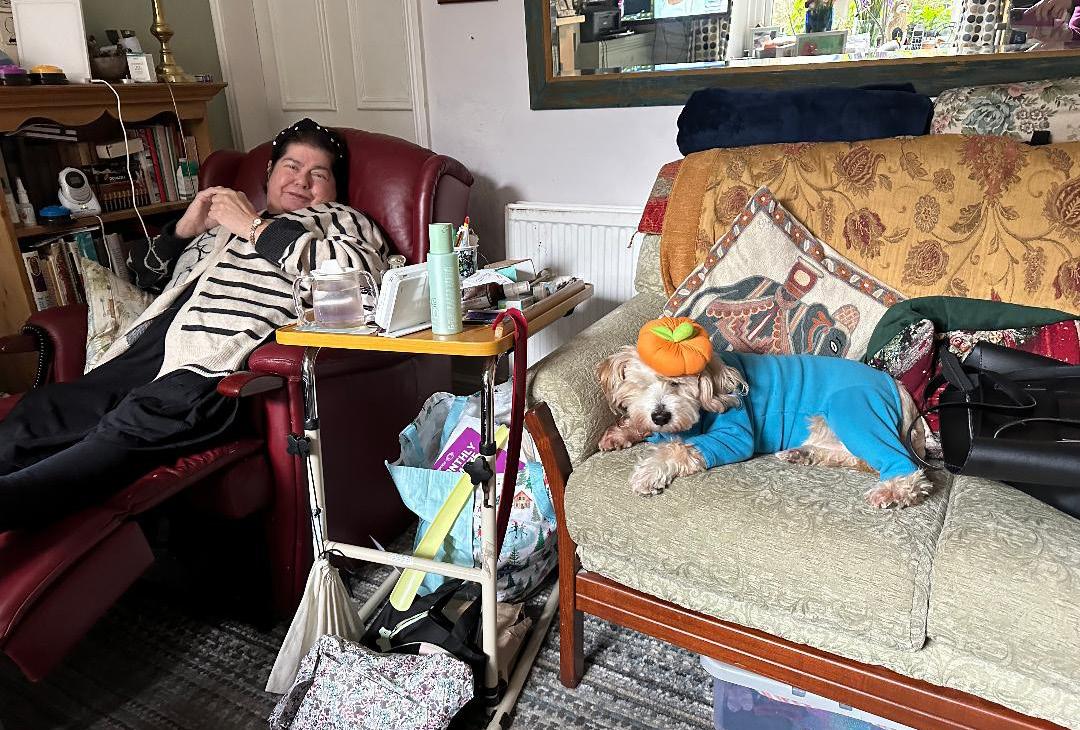
SARAH AND HER DOG
NEW SUPPORT GROUPS TO IMPROVE SUPPORT LOCALLY
Driven by their own personal experience of PSP, two volunteers set up new support groups to help others living and affected by PSP & CBD.
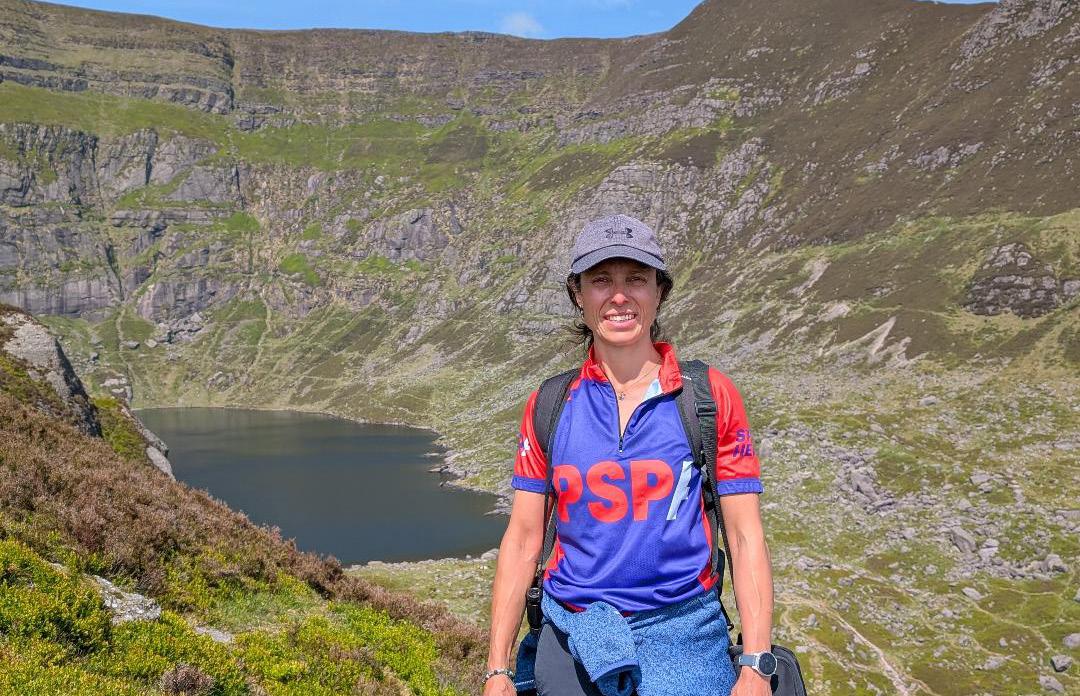
KRISTY
When Kristy’s mum Jennie began experiencing behaviour changes in 2019, it marked the start of a long, confusing journey.
As an only child, Kristy found herself navigating a maze of professionals and diagnoses, with the support of her husband. Some of the professionals hadn't even heard of PSP. They initially put Jennie's behaviour down to a personality disorder, then dementia or Parkinson's.
"We didn’t know what was happening," Kristy recalls. "It was really tough, being bounced between different specialists who couldn’t give us a clear answer." Kristy researched similar diseases online. However, it was after a fall, during an assessment in hospital that a
Neuro Specialist identified traits of PSP. It wasn’t until she reached out for advice via the PSPA’s website that the pieces began to fall into place.
By the time Kristy’s mum was eventually diagnosed with PSP in 2022, her symptoms were already quite advanced. Her mobility was very poor and she was unable to make safe decisions, so had to be moved from her very much loved home to a flat with extra care facilities 24/7.
Kristy's step-grandmother had Parkinson’s disease, so she had seen what neurodegeneration could look like—but her mum’s symptoms were different. “She had behavioural changes that just didn’t make sense. It was upsetting, because I was trying to fit it into a box.”
KRISTY RAISING AWARENESS OF PSP
“THERE WAS SO MUCH STRESS AT THE TIME, BUT I NOW I FEEL I'M IN A BETTER POSITION TO HELP OTHERS GOING THROUGH THE SAME THING."
Once connected with PSPA, Kristy and her husband attended the Hampshire Support Group. This was a struggle, it being some distance from Portsmouth and with both of them working shifts. "It was daunting at first—I didn’t know if I was ready to open up. Speaking about Mum and PSP felt too painful. But everyone was welcoming. We were all in the same boat."
Kristy was surprised at how much she opened up at the group and how helpful she found it. Although her mum was too unwell to attend herself, the support and understanding Kristy found in that group stayed with her. After her mum died in 2024, Kristy took a career break to process the grief and reflect on how she could give back.
“There was so much stress at the time, but now I feel I'm in a better position to help others going through the same thing. There’s no Southern East support group for PSP, and I felt like I could change that.”
Kristy contacted PSPA and decided to start a new Support Group in Portsmouth. She started to look at suitable venues. “I visited six or seven church and community halls,” Kristy says. “We finally chose a lovely, light-filled space in Farlington with good parking and easy motorway access.”
The first support group meeting was held in August. "If this new group can help just a few people, it will be worthwhile."
Kristy wants to make the group a positive place where people leave feeling better than when they arrived.
“When I think about the quality time I had with Mum in her latter years, remembering good times with music and photos - that’s what I want to bring out in others too. The group I went to was so upbeat which was lovely to experience.”
Kristy's mum, who worked as an accountant until she retired at 60, was the life of any party. “She loved music, dancing, films, and had a real zest for life. She was kind, generous, and had time for everyone.”
Sadly, retirement wasn’t the beginning of a new chapter for her mum. "She started showing signs at
66. By 70, she was gone. It was fast—everyone at the group said that. A post-mortem confirmed it was PSP.
“She would be so proud of what I’m doing now. I want to be a bridge between people and PSPA so others aren't filled with unanswered questions.”
Kristy's inspiration also comes from a family tradition of care. “My grandma was a dedicated AA telephone buddy, and my mum cared for her uncle who had Alzheimer's.”
“Mum’s illness made me realise—time is short. We’re making the most of now by travelling, spending more time with my father and hopefully giving back to the community.”
PHILIP MCCARTHY
Three years ago, Philip’s wife Helen was diagnosed with PSP. Neither of them had heard of the condition, and Helen’s neurologist offered little information or guidance on what to expect or where to turn for support.
“We only found out more through a friend of our daughter, whose mum had CBD,” Philip explains. “That was our first real insight.”
Helen and Philip initially felt isolated. A contact at PSPA suggested Philip join the nearest support group in Hampshire, but with Helen struggling with long car journeys, in-person meetings and a three hour return away weren’t realistic. Philip joined remotely and also joined the regional, national and, latterly, the men’s carer online groups.
“The groups have been a lifeline. You can bring a problem to the group and someone will always have a possible solution, even if they live in a different area. The NHS feels like a computer game with no clear way forward. What I soon realised is my ‘cheat sheet’ is the support group. Hearing about other people’s experiences helps you to navigate your own.
During one regional Zoom call, Philip mentioned he was the only member from Gloucestershire – only to discover two others on the call were local too.
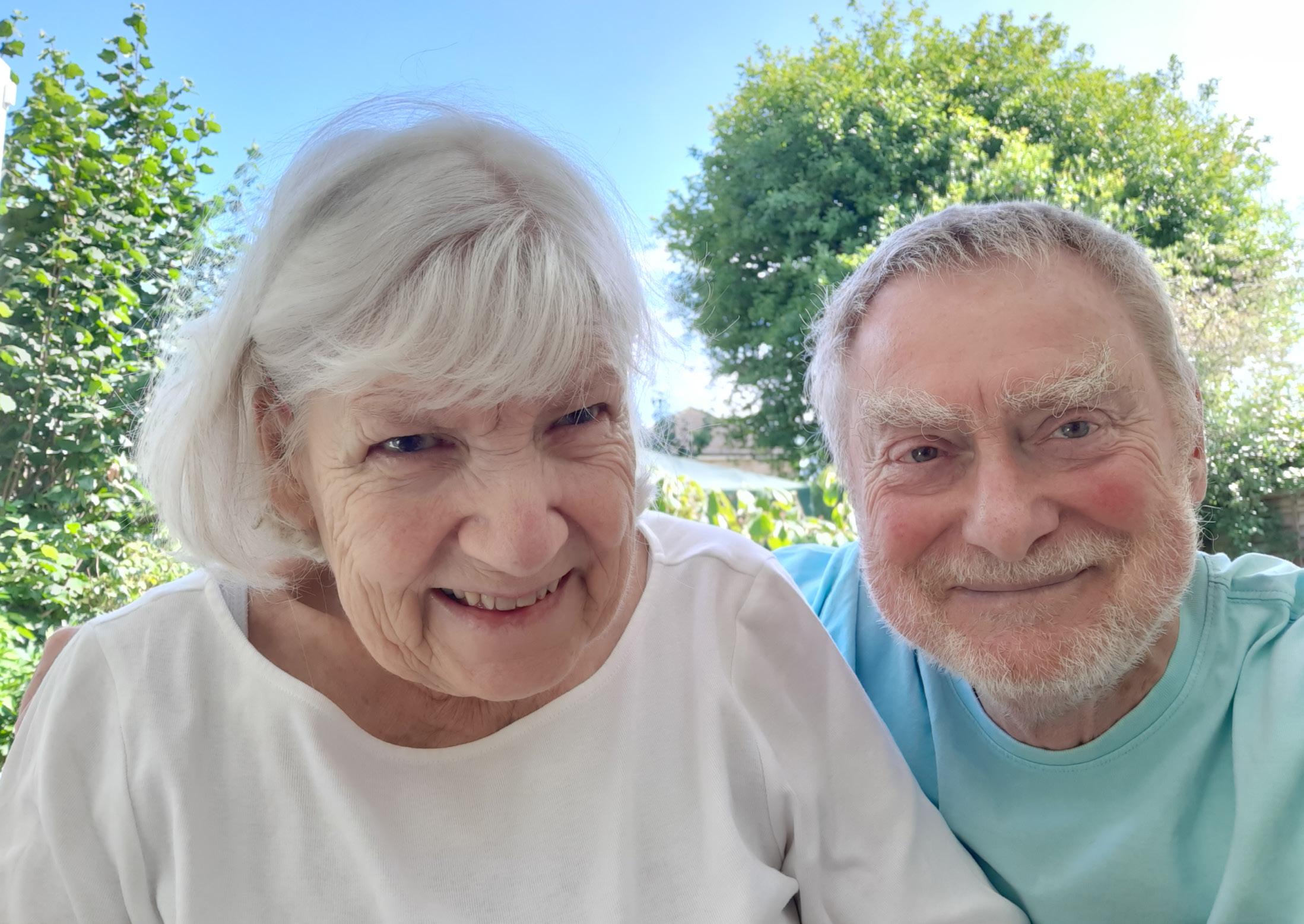
They arranged to meet at a garden centre, and soon, the group grew rapidly. The second meeting drew 17 people from across Gloucestershire and even Monmouthshire.
“It showed how badly this kind of support was needed locally,” Philip says. “We’d unintentionally taken over the café area.”
One of the group members offered their commercial premises and the group now meet every two months. While Philip is happy to arrange the meetings, he is unable to take on the volunteer role of group coordinator, so PSPA is looking for someone to fill this role.
“As a full-time carer, my priority is Helen,” he says. “Having a routine helps, and we now have a carer come in two mornings a week to help. But it’s still exhausting. It’s certainly not the retirement we had
planned. It really has helped to connect with others in the local group and I hope someone will be willing and able to take on the coordinator role.”
“THE GROUPS HAVE BEEN A LIFELINE. YOU CAN BRING A PROBLEM TO THE GROUP AND SOMEONE WILL ALWAYS HAVE A POSSIBLE SOLUTION, EVEN IF THEY LIVE IN A DIFFERENT AREA."
If you live in Gloucestershire and are interested in coordinating the group please contact Lavonne on lavonne.mccormack@pspassociation.org.uk or call 01327 362461.
HELEN WITH HER HUSBAND PHILLIP
£2,400
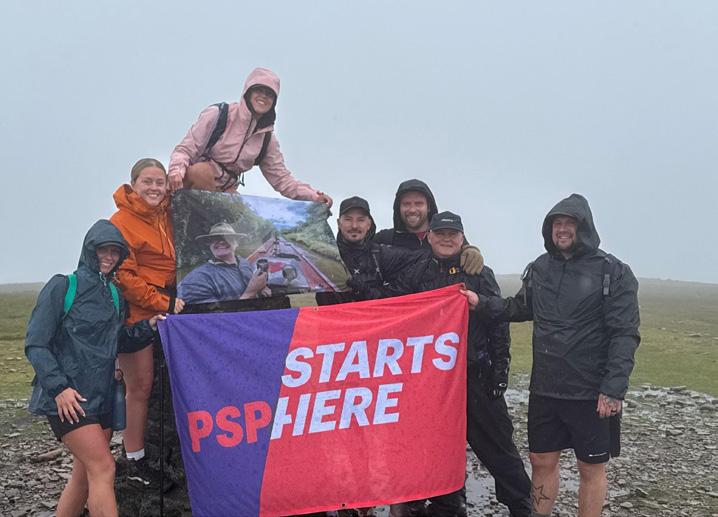
THREE PEAKS FOR JERRY
Zoe Pointon, along with her husband and a group of friends climbed the Yorkshire Three Peaks in memory of her dad Jerry, who died from PSP in 2024. The team smashed their target and raised an incredible £2,400.
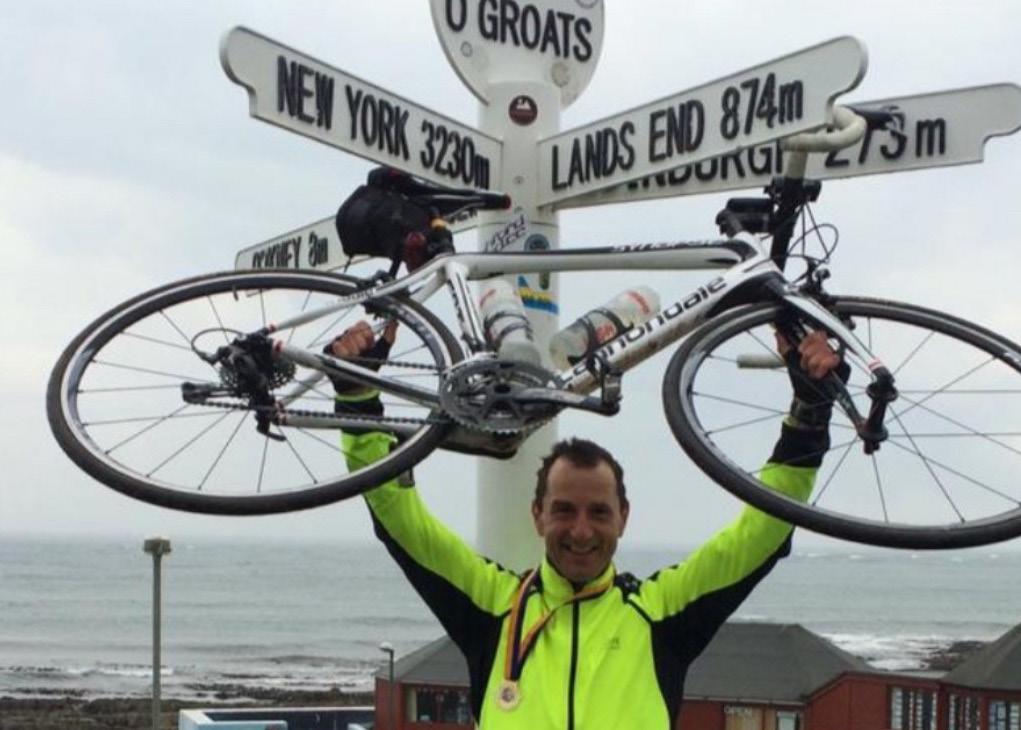
£2,500
THREE CHALLENGES FOR TERRY
Erem Demirel decided to raise money for PSPA when his friend Terry, sadly died from PSP. Erem took on three gruelling challenges: the Inverness Half Marathon, Etape Loch Ness and finally the Bolton Ironman and has so far raised over £2,900.
TO ALL OUR SUPPORTERS
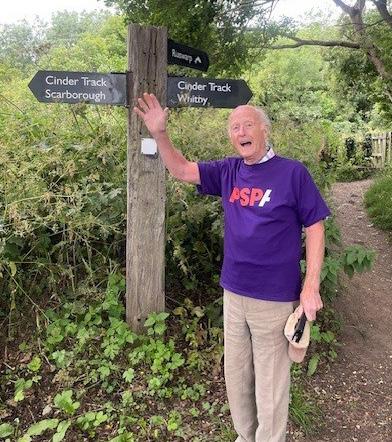
£1,600
FOR SUZANNE
John Maskill is taking part in PSPA’s Pathway to Progress by walking 21 miles from Whitby to Scarborough. John’s walking in memory of his wife Suzanne, who died in March of this year from PSP. He has smashed his target of £1,000, having so far raised a brilliant £1,600.
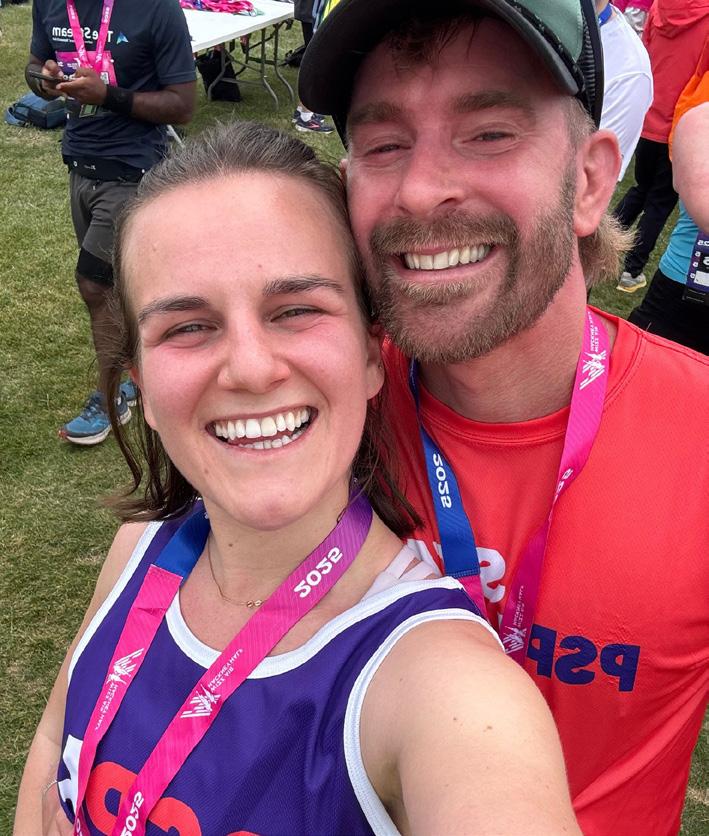
£1,500
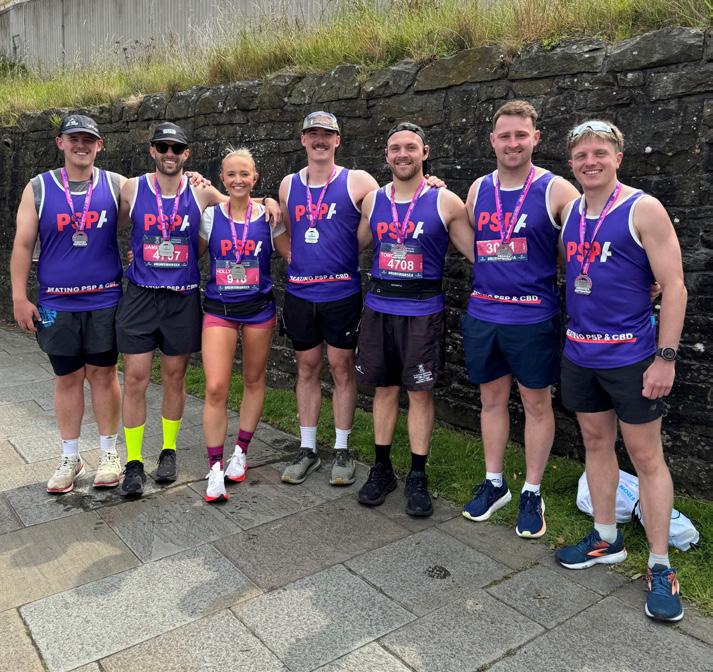
£3,200
A FAMILY AFFAIR
Tomos Northey and his friends took on the Swansea Half Marathon in honour of his mum Andrea, who was diagnosed with PSP and had previously ran the half marathon twice. Family and friends came out in support for Tomos and Andrea, raising an amazing £3,200.
HACKNEY HALF MARATHON
Claire and Angus Jenkyn took on the Hackney Half Marathon, for Claire’s dad who was diagnosed with PSP four years ago. Since being diagnosed, he has faced increased challenges with mobility, speech, swallow and cognition. Claire and Angus beat their target and have raised over £1,500.
PSPA CHRISTMAS 2025 ORDER FORM
Delivery and contact details (Please complete in BLOCK CAPITALS)
You can also order items at pspassociation.org.uk/fundraising/shop
Name: Address:
Postcode:
Email:
We greatly appreciate your support and would like to keep in contact with you about our news including stories and information about our supporters, research projects, volunteering, fundraising activities and appeals. Please select all the ways you would like to be contacted below: Email Post Phone
PSPA will use your personal information only for the purposes for which you have given us consent. We will keep your data confidential and safe, and will never swap or sell it and you can always withdraw your consent at any time by emailing info@pspassociation.org.uk or calling 01327 322410. You can see our privacy statement at pspassociation.org.uk/home/privacy-policy which explains how we collect, store, manage and use your personal information.
For payment by credit/debit card please complete the form below.
For order queries please email shop@pspassociation.org.uk or call 01327 322414
Telephone:
2025/001 Hummingbird Ornament £5 each
2025/002 A Partridge in a Pear Tree £5 per pack of 10
2025/003 Born Under a Star £5 per pack of 10
2025/004 Christmas Eve Carols £5 per pack of 10
2025/005 Christmas Snow Globe £5 per pack of 10
2025/006 Festive Donkey Stable £5 per pack of 10
2025/007 Last Post at Christmas £5 per pack of 10
2025/008 Little Town of Bethlehem £5 per pack of 10
2025/009 Little Toy Shop £5 per pack of 10
2025/010 Peace, Love and Joy £5 per pack of 10
2025/011 Stuck Down the Chimney £5 per pack of 10
Orders up to £10 £3.50
Orders over £10 £5.50
Orders over £50 £8.50
DELIVERIES:
Deliveries are normally despatched within seven working days.
Total order: £ Plus postage and packing: £
In addition, I would like to make a donation to PSPA: £ I enclose a cheque to PSPA, of the total vale: £
PSPA CHRISTMAS 2025 PAYMENT FORM
(Please complete in BLOCK CAPITALS)
I WOULD LIKE TO PAY £ BY
Cardholder’s name:
Billing address for card account (UK card holders only)
House number/name:
Postcode: Signature: Date:
Thanks to the Gift Aid scheme, PSPA can reclaim 25p for each £1 you give, increasing its value to £1.25. In order to Gift Aid any donations given in addition to your order, please ensure you tick the box below:
I want to Gift Aid my donation and any donations I make to PSPA in the future, or I have made in the past four years. I am a UK taxpayer and understand that if I pay less Income Tax and/or Capital Gains Tax than the amount of Gift Aid claimed on all my donations in that tax year it is my responsibility to pay any difference. Gift Aid is reclaimed by the charity from the tax you pay for the current tax year. Your address is needed to identify you as a current UK taxpayer. Please notify us if you wish to cancel this declaration, change your name or home address, or if you no longer pay sufficient Tax on your income and/or Capital Gains to cover the amount of tax claimed.
Just call 01327 322410 or email info@pspassociation.org.uk Date: / / I am not a UK taxpayer. Please do not send cash or postal orders. If your selection is not in stock PSPA reserve the right to substitute an alternative.
PLEASE RETURN THIS ORDER FORM TO: FREEPOST PSPA
When using our freepost address, just write FREEPOST PSPA – we promise it will get to us! Please note, writing our full address when using our freepost address can cause processing delays for Royal Mail and extra charges for PSPA of up to £2 per letter.
CHRISTMAS COLLECTION 2025
Message in all cards: “With best wishes for Christmas and the New Year”

A PARTRIDGE IN A PEAR TREE
Size: 126mm x 126mm

CHRISTMAS EVE CAROLS
Size: 126mm x 126mm

LITTLE TOWN OF BETHLEHEM
Size: 126mm x 126mm
NEW for 2025


BORN UNDER A STAR Size: 126mm x 126mm

CHRISTMAS SNOW GLOBE
Size: 126mm x 126mm

LITTLE TOY SHOP
Size: 126mm x 126mm
ALL CARDS ONLY £5 PER PACK OF 10

HUMMINGBIRD ORNAMENTS

Available in the following colours: Mauve (New for 2025), Blue and Clear

FESTIVE DONKEY STABLE
Size: 126mm x 126mm

PEACE, LOVE AND JOY
Size: 126mm x 126mm (blank inside)

LAST POST AT CHRISTMAS
Size: 126mm x 126mm

STUCK DOWN THE CHIMNEY
Size: 100mm x 150mm
